NORTHUMBRIA
Forecast: A Bright Future

Forecast: A Bright Future
8 PAGES
The Association to Advance Collegiate Schools of Business (AACSB) accredited


Newcastle Business School’s business programmes earlier this year and accounting programmes have now also gained this professional recognition. This achievement puts Northumbria in the unique position of being the only university in Europe to gain a double accreditation for business and accounting from AACSB International – placing Newcastle Business School firmly among an elite group of less than 1% of business
schools worldwide.
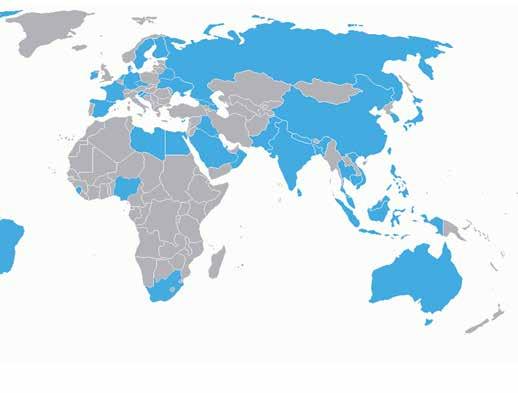
AACSB accreditation is considered to be the hallmark of excellence in business and accounting education. Only 181 of the 16,000 institutions worldwide offering business degrees have achieved it for both their business and accounting programmes.
The accreditation recognises those schools which have consistently demonstrated a high-quality teaching environment, innovative courses and active work with professions and industry.
“AACSB congratulates Northumbria University and Executive Dean

Kevin Kerrigan on earning AACSB Accreditation for its accounting programmes,” said Robert D. Reid, Executive Vice President and Chief Accreditation Officer of AACSB International.
“It takes a great deal of self-evaluation and determination to earn both accounting and business accreditation.
“Newcastle Business School has not only met specific standards of excellence, but has also made a commitment to
ongoing improvement to ensure that the institution will continue to deliver high quality education to its students.”
Kevin Kerrigan, Executive Dean for Northumbria’s Business and Law courses, said: “Securing double accreditation in business and accountancy is incredibly rare and extremely challenging.
“Our success enhances our reputation as one of the world’s best business schools and makes us the first in Europe to achieve the double. We are all enormously proud of the prestige this brings and of the opportunities it affords
our students and staff.”
Northumbria’s Vice-Chancellor and Chief Executive, Professor Andrew Wathey, said: “This globally recognised accreditation reflects the quality of our research-informed teaching and the University’s focus on graduate employability, innovation, excellence and impact.
“It will allow Northumbria to collaborate with those other leading institutions that have achieved AACSB accreditation, creating a globally significant group of business schools.”

‘‘
‘‘
Top 1% of global business schools
Northumbria University was able showcase its outstanding facilities to some of the netball world’s leading figures when it was used as a training camp ahead of the Commonwealth Games.
Acohort of umpires from the International Netball Federation and the Jamaican women’s netball team convened at Northumbria’s Sport Central before travelling to Glasgow to take part in the Games.
The umpires updated their skills and knowledge with specialist training from leading academics on Northumbria’s Sport Science and Psychology programmes.
During the three-day camp, the umpires and players stayed in Northumbria’s halls of residences and benefitted from sessions such as injury prevention, nutrition and the importance of sleep and recovery for professional athletes.
They also took part in live warm-up matches in Sport Central’s main arena as the Jamaican women’s team took on the University’s own Team Northumbria, who finished sixth in last year’s Netball Superleague table.
The Jamaican team went on to beat England to win the Commonwealth bronze medal.
Professor Kath McCourt, CBE, Executive Dean of Northumbria’s Health and Life Sciences courses, said:
“We were delighted to be able to offer our specialist teaching, research and sports science facilities to some of international netball’s leading figures in advance of the Commonwealth Games.
“The training camp was an excellent example of how we can offer professional sports teams and federations access to some of the best sporting facilities in the country.
This, when combined with the latest academic knowledge and research into Sports and Exercise Science and Psychology, puts Northumbria University at the forefront of providing support to elite athletes and those associated with Sports Management.”
Dawn Jones, the former Chair of the International Netball Federation, who arranged the training camp at Northumbria, said: “We were greatly appreciative of the input of Northumbria’s staff, both presenters
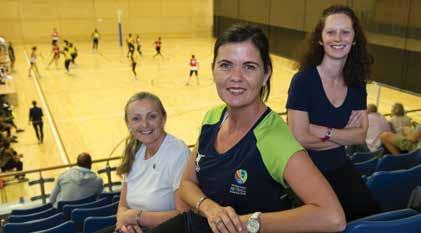
and those in Sport Central, with whom we worked each day. Everyone was extremely helpful and the quality of the presentations was very high.”
Northumbria University already offers physiological support to athletes through its partnership with England Athletics as a regional testing centre.
The centre, which is led by the British Association of Sport and Exercise Sciences (BASES), provides athletes and coaches with access to University’s Sports Science facilities.
These include physiology, nutrition, biomechanics, performance analysis, gait, integrated performance, strength and conditioning laboratories and an environmental chamber that can simulate extreme temperatures and high or low altitude conditions to give athletes experience of training in other climates. The centre also provides access to facilities within Sport Central including its running track, swimming pool, sports halls and 3,000 seat main arena.

The 993 bedroom accommodation has proved a popular choice among new and continuing students, which is no surprise considering the range of facilities and lifestyle on offer for Gateshead’s first student community.

Prior to opening, the media were given a sneak-peek inside the selfcontained flats and studio apartments, with the Evening Chronicle reporting that: “Students moving into the new Northumbria University accommodation in Gateshead this month can expect to live in the lap of luxury.”
The eyes of the world will be on England next year for the Rugby World Cup, and thanks to our excellent facilities, Northumbria University has been confirmed as the UK training base for the Tongan national team.
Rugby World Cup organisers England 2015 carried out a nationwide search for the very best training facilities, sports clubs, hotels and universities, to provide 20 teams with a place to stay and train during next year’s tournament.
With three games being held at St James’ Park in Newcastle, the organisers were keen to have high-quality bases in the North East region.

Northumbria was officially designated as a Team Base for the Tongan team after going through rigorous inspections and discussions with the teams and organisers.
The Tongan’s will use the University’s outdoor grass pitches at Bullocksteads and the indoor training hall, fitness
facilities and swimming pool at Sport Central.
Professor Paul Croney, Deputy ViceChancellor, said: “Northumbria already has an outstanding reputation for excellence in sport. We have invested heavily to develop world-class facilities that are used by students, members of the public and professional athletes alike, most recently the Jamaican women’s netball team before the Commonwealth Games.
“We are delighted that the organisers of next year’s Rugby World Cup have recognised the benefits that we can offer as a training camp and we very much look forward to welcoming the Tongan team to our campus.”
Elsewhere in the region, the South
African and Samoan teams will train in Gateshead at the International Stadium and at Gateshead College’s Academy for Sport. New Zealand’s team will be based in Darlington and the Scottish team will use the Royal Grammar School’s facilities in Newcastle.
England Rugby 2015 CEO, Debbie Jevans, said: “As the organising committee for Rugby World Cup 2015 we are committed to ensuring that all participating teams have the optimum training environments available to them throughout the Tournament.
“Rugby, rightly, is at the heart of all our planning and we have worked closely with the teams to ensure that they have access to facilities and a Team Base that meet their individual needs.”
The Rugby World Cup 2015 kicks off next September. The Tongan team will take on defending champions New Zealand at St James’ Park on Friday 9 October.
northumbria.ac.uk/courses
were designed in consultation with Northumbria’s Students’ Union, who arranged focus groups with students to ensure that the designs reflected their needs. Jamie Thompson, VicePresident, Welfare and Equality said:
“We wanted to make sure our students could be part of the excitement and tell us exactly what they wanted to see in student accommodation, and due to our partnership with Campus Services this was made possible.
For more information about Trinity Square’s availability in 2015, please email: rc.accommodation@northumbria.ac.uk
rugbyworldcup.com
The media preview was also attended by one of Trinity’s first student residents, Rachel Kemp, a 2nd year Childhood Studies and Early Years student. Rachel said: “The main reason that chose Trinity Square was the social aspect of it. There are so many facilities to use, such as the student hub, the gym and the outdoor space. The views are also fantastic.
“The transport links to Newcastle and the city campus are also fantastic. Gateshead interchange is right on the doorstep meaning you can get to wherever you need to go.”
The social spaces at Trinity Square
“The result was a huge mix of social spaces – quieter study and reading areas but balanced with media and gaming and even a cinema space. I think that students are going to have a fantastic time there and it can only encourage friendship building for our students – with something for absolutely everyone. I have no doubt the student community at Trinity Square will be one of the best at Northumbria.”
The wider Trinity Square development, immediately below the accommodation, also features a Vue Cinema, Tesco store, Frankie and Benny’s, Nando’s and local skateboarding shop, Skate Shack –giving students access to a mix of high street and independent retailers.
Final year students have rated more than half of Northumbria University’s subjects as being better than those offered by other universities in the 2014 National Student Survey.

The annual survey measures the opinions of students about to finish their degree on their experiences of studying at their chosen university and the quality of their courses.
The findings are used by prospective students, their families and advisors to help them to make informed choices on the best places to study.
The top score of 100% satisfaction was achieved by Building Services Engineering; Business with International Management; Childhood Studies and Disability Studies; English Literature and History; Human Nutrition; Interior
Architecture; IT Management for Business; Spanish with Business, and 3D Design.
Other programmes achieving high levels of satisfaction included Nursing Studies and Leadership and Management which each achieved 98% and Architecture; Fashion; Interior Design and Sport Management, which all scored 97%.
In total, more than 40 courses scored satisfaction ratings of 90% or above.
Nursing and healthcare students also reported higher than average satisfaction with their courses, compared to those offered by other institutions.
Students also reported that the academic support they were provided with was higher than the sector average and said that they were more satisfied with the organisation and management
of their courses and with the Students’ Union than in previous years.
Professor Andrew Wathey, Northumbria Vice-Chancellor and Chief Executive, said: “The National Student Survey reminds us what we are here for.

It is one of the most important sources of feedback from students, telling us what is most important to them.
“This year’s results are evidence of our hard work in recent years to provide our students with an excellent academic experience.
“They also complement our recent improved ranking in the Times Higher Education’s annual survey, in which Northumbria was ranked 21st out of 111 universities for student experience.”
DISCOVER MORE
northumbria.ac.uk/courses

“The National Student Survey provide an opportunity for students to reflect on their time at university, providing invaluable feedback to institutions and providing information on the student experience to future students.”

Almost 1,000 Northumbria students are settling in to the brand new Trinity Square development in Gateshead – and they’re already anticipating a student experience like no other.
Volunteers for an international disaster search and rescue team have undertaken intensive training on how to respond to emergency situations at Northumbria University.
The trauma training day for the International Rescue Corps (IRC) at Northumbria’s Clinical Skills Centre helped volunteers to gain an insight into the injuries they may have to treat while in disaster situations.

The UK-based charity, which is registered with the United Nations, has responded to disasters such as floods, hurricanes and earthquakes in countries including Indonesia, China, Mozambique and Japan.
The event gave IRC members the opportunity to work with academics and experience dramatic scenarios and simulations. These included traumarelated workshops which covered how to handle spinal care injuries, resuscitation scenarios and effectively treat major cuts and wounds.
Tony Conner, Senior Lecturer in Adult Nursing and a member of the IRC, said:
“It’s so important for our volunteers to have access to state-of-the-art facilities whilst being trained up, as well as having the opportunity to be taught by lecturers with such high expertise in the field.
“We are relied upon in real-life disasters so it’s crucial that members of the organisation know exactly what to do in an emergency.”
Tony has worked as a volunteer for the IRC for several years. He found himself in Padang tackling the devastation caused by the Indonesian earthquake in 2009 and shortly after was called on to rescue flooding victims in Cockermouth, Cumbria.
“Indonesia was my first earthquake experience and was very humbling,” said Tony. “The local population carried on with their lives as best they could. “It was the first time I had to search under a collapsed building alongside a very experienced rescue worker. The thought that the building may collapse at any minute was always at the back of my mind.
“Another major rescue mission was within the Cockermouth floods where we helped to rescue people from their homes via upstairs windows and provided water and food to people trapped within their own homes. The water was very fast-flowing which made any rescue mission difficult.
“However, with the training each IRC member undertakes, it allows each rescue worker to function as a valuable team member. This is why the training held at Northumbria is extremely valuable to us as a team.”
Sheila McQueen, Head of Public Health and Wellbeing, said: “We are
absolutely delighted to provide access to our excellent clinical centre and simulation facilities, which allows the charity to continue their admirable response services to the world when tragedy occurs.”
A team from Newcastle Business School was recently named winners of the annual Institute of Direct and Digital Marketing’s national student competition during a glitzy event at Google’s headquarters in London.
Marketing students throughout the UK were asked to submit marketing communication campaigns for GAP 360, a travel provider with ambitions to become the market leader in gap year travel by 2016. Over 70 entries were received from universities across the UK and no less than three of the four finalists were from Northumbria University. The winning team, called the Gap Packers, consisted of a group of six students from Newcastle Business School’s Advertising Management course who won the panel over with their creative ideas and entertaining pitch.
NORTHUMBRIA UNIVERSITY’S Pro Vice-Chancellor, Lucy Winskell, has been awarded an OBE for services to Higher Education and the regional economy in the North East.
Richard Gay, Principal Lecturer in Marketing, said: “Newcastle Business School has a long and successful history with the national competition, winning one bronze, three silver and two gold awards in the past three years alone. This is an incredible achievement that nods heavily to the hard work and dedication of all students and staff members involved throughout the competition process.
“The Institute of Direct Marketing has a worldwide reputation for standing as the leading forward-looking institute for marketing practice, and to be recognised year-on-year for our young talent is no small feat.”
Winning team member Danielle Brown, added: “The competition enabled us to work on a direct and digital marketing campaign project from concept to pitch and then present to the actual client, which was a great experience. We had to develop a creative which would appeal to the client’s target audience but then also incorporate elements of tracking and evaluation to show its success.
“Each of the teams from Northumbria University had really strong campaign ideas, we’re over the moon that we won amidst such strong competition.”
northumbria.ac.uk/nbs
Lucy is responsible for leading the development of the University’s relationships with government, public bodies, businesses and the professions. She has extensive experience of working with regional, national and international businesses and became Chairman of the Board of the North East Chamber of Commerce earlier this year. She will be presented with her OBE in the coming months.
NORTHUMBRIA UNIVERSITY NEWS has been shortlisted for the Best Publication title in the Chartered Institute of Public Relation’s PRide awards.
The newspaper was first developed in September 2013 to showcase the University to prospective students and Open Day visitors. However, readership quickly grew and the newspaper’s focus has expanded and now includes contributions from current students and external partners.
northumbria.ac.uk/courses
A SOCIAL enterprise project supported by academics and students from Northumbria Engineering and Environment courses has been nominated for a national award.
The Skill Mill, set up and run by Enterprise Fellow Dr Peter Glaves alongside a team of volunteers, students and graduates, has been shortlisted for the Children and Young People Now (CYPN) national awards under the youth justice category.
Rochelle, who was president of the Students’ Union’s sustainability society, has been a driving force in developing sustainable practice during her time at Northumbria. She encouraged students to take part in the Green Impact initiative and helped to develop audits of how sustainable the University was.
She is one of only 23 participants from around the world, and the only student from the UK, to travel to Brazil’s rainforest to attend a summer school organised by the Amazonas Sustainable Foundation.
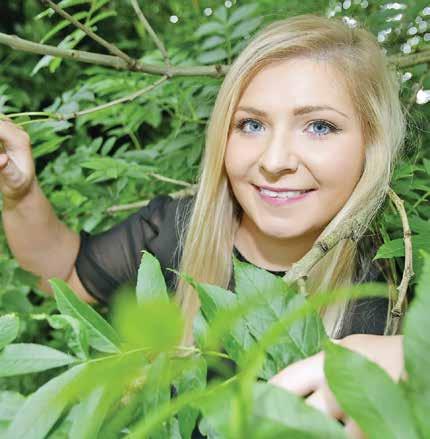
During the three-week course, Rochelle and the other participants will learn about the evolution of sustainability in the region and discover how to survive in the rainforest, using plants for medicinal purpose. They will take part in sessions with Amazonian natives to learn how to build boats and houses and will meet with United Nations leaders working in the area of environmental regulation.
Green Digit Gardening’s environmentally friendly SEEDCELL product and Moltin’s ecommerce software jointly took the top prize in the University’s Business Challenge competition. The competition is open to all students and recent graduates who have a business idea or have recently begun trading.
Green Digit Gardening was set up by Design
The newspaper is shortlisted in the North East PRide awards, with the winners going forward to the national finals. The awards will be announced in December.
To read the latest edition of Northumbria University News online visit northumbria.ac.uk/newspaper

Rochelle plans to stay on in Brazil when the programme ends to take part in more project work and volunteer as a swimming teacher, giving lessons to local children.
Rochelle said: “This is an amazing opportunity for me. I think it will be quite challenging as it is about leadership and management around an incredibly important and planet-wide issue.
“The trainers in Brazil will be looking to see where the sustainability leaders of tomorrow are, and whether they have a flair for making positive things happen at a genuinely international level.”
She added: “There is a real focus at the University on the value of volunteering and other extra-curricular activities to enhance both the student experience and career opportunities, and this certainly helped with my application to the Amazon summer school.”
The CYPN awards recognise initiatives from the public, private and voluntary sector that work with children and young people from birth to adolescence as well as their families.
Initiatives range from those aimed at all children and families within a community or are targeted at those who are the most vulnerable or disadvantaged. Crucially, entrants must be able to provide evidence that they have had a positive impact on people’s lives.
Dr Glaves said: “Universities are not just about teaching, but about positive impacts to the region. As such we are proud to be involved in the Skill Mill and in the work it is doing with helping ex-young offenders back into jobs. It is great to see that the impact of the Skill Mill being nationally recognised.”
for Industry graduate Dan Robson. His work placement in a plastics factory led him to realise how much waste was involved in packaging products. Cue SEEDCELL – his gardening product made entirely of recycled packaging. Designed in the shape of a pizza with seeds inserted into each ‘slice’, the SEEDCELL uses the thin tip of the slice to push seeds into the soil, eliminating the need to use gardening tools. The
fully bio-degradable packaging also retains water, ensuring that the seeds planted are fed without being over-watered.
Since graduating last year, Dan has worked on developing the business and is now selling his SEEDCELLS at more than 35 retail outlets, National Trust Shops around the UK and at the Eden Project in Cornwall. He is also in talks with national department stores that are keen to stock his product.
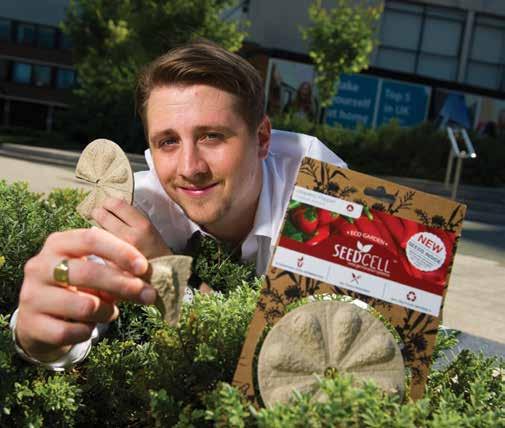
Dan said: “I’ve had a huge amount of support from Northumbria’s Student and Graduate Enterprise scheme, which has really helped to accelerate the growth of the business. Thanks to their advice and guidance I am now working towards supplying larger retail chains, scaling the business up by going into mass production, and I’m also starting to look at spin-out products.
Founders of Moltin ecommerce, Jamie Holroyd and Adam Sturrock, met when working together at a web development agency and witnessed the frustrations of working with ecommerce software. They began to develop their own ecommerce platform which would allow developers to work in any programming language on any device.
Their business has already garnered impressive testimonials from clients giving the pair high hopes for the future.
“I studied Computer Science and was able to take a module which focused on the business aspects of the tech industry,” said Jamie.
“There was a real career focus – I learnt how to prepare business plans and financial reports which allowed us to secure investment.
“I have maintained a relationship with Northumbria since graduating and our company
has received a great deal of support from the University. They have helped with legal advice and on general issues you face when setting up a business.”
Lucy Winskell OBE, Pro Vice-Chancellor for Business and Engagement, said: “Northumbria is committed to developing the entrepreneurial and enterprising skills of our students. We provide wide-ranging support to help our students and graduates to maximise the potential of their business plans and continue this through the start-up process and beyond.
“To date, Northumbria’s graduate start-ups have a combined turnover of £54 million and employ almost 800 people. These figures are significant and further reinforce why we are committed to supporting our students and graduates with their business ideas.
Northumbria was recently rated the fourth best university in the UK for helping students and graduates to start-up their own businesses.
northumbria.ac.uk/sgenterprise
Law graduate Rochelle Martin is enjoying the experience of a lifetime after being chosen to represent the UK at an elite programme for future sustainability leaders in Brazil.
A Polish-born graduate artist, whose work explores the relationships between nature, objects and architecture, has won the Woon Foundation Painting and Sculpture Art Prize for 2014, run by Northumbria.


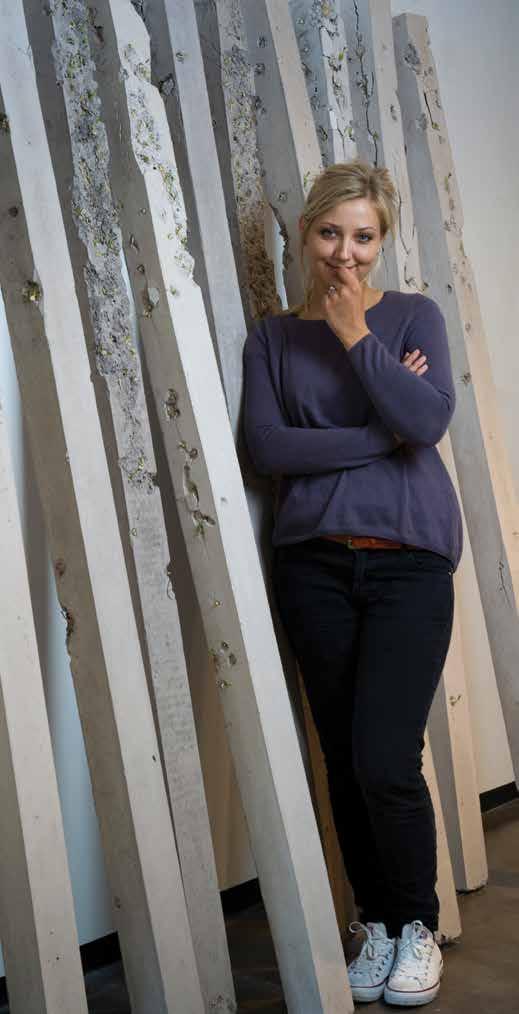
Ramona Zoladek, who graduated from Anglia Ruskin University this summer, was named the winner of the UK’s most prestigious student art award at a ceremony in Northumbria’s Gallery North.
The total competition package of £40,000, sponsored by Northumbria law graduate and philanthropist Mr Wee Teng Woon, equals in value Britain’s biggest art award, the Turner Prize.
Ramona beat competition from student artists across the country to claim the national competition’s top prize, the Woon Tai Jee Fellowship. Named after Mr Woon’s late father, the fellowship includes a £20,000 bursary, use of the Woon Tai Jee studio space in the BxNU Institute of Contemporary Art in BALTIC 39, and mentoring from BALTIC Professor and Turner Prize-nominated artist Christine Borland.
Ramona, said: “I can’t believe it. I feel very lucky to be chosen. I never expected to be shortlisted, let alone win! It’s the most amazing thing that could happen to me. I can now fully dedicate my time to working in the studio and not worrying about funding for materials. This is a dream for any artist.
“It will be a great start to my artistic career.
Hopefully I will develop my practice and build a professional portfolio and profile. The overall experience will give me confidence. I want to focus more than ever on my practice, keep developing, and get the most out of this opportunity. I hope to exhibit as much as I can.” Ramona’s work revolves around ideas of growth, ruin and the history exposed by these objects and architectural units as they interact with nature. Her winning piece is composed of concrete and plaster planks that have living roots and seedlings embedded into them, growing out of the crevices and flaws in the structures.
Northumbria University’s partnership with Live Theatre is helping to create numerous opportunities for students and academics alike to gain valuable experience in the cultural sector. Thanks to this partnership, Journalism student Rosie Willan was invited to interview the celebrated playwright Lee Hall for The Journal newspaper before he delivered readings of his latest screenplays. Northumbria University News publishes an exclusive extract of Rosie’s feature.
In 1998, a selection of Lee Hall’s work was read exclusively for Live Theatre audiences. It included Dancer which went on to become
Oscar-nominated film Billy Elliot
His later play, The Pitmen Painters premiered at Live Theatre in 2007 and has since sold out the National Theatre in London, run on Broadway and toured the UK. It’s obvious that maintaining a strong relationship with the theatre he credits so much of his success to is hugely important for Hall. “My friends are all jealous of the bond I have with Live Theatre. There are very few places like it in the country – it’s certainly my artistic home. I wouldn’t be the writer I am or have had the success I’ve had without it.”
His most recent project features
a series of screenplays still in development, on a range of topics from George Orwell to Elton John. The last of the series is based on the true story of a French composer who wrote one of his most famous pieces of music whilst languishing in a German Prisoner of War camp in the 1940s.
Hall explained: “It’s a beautiful story about a group of people coming together to make an extraordinary piece of music in difficult circumstances. The audiences in Newcastle really seem to understand my work so having the chance to present these pieces which are still in development and get feedback at this stage is extremely valuable to me as a writer.”
Born and bred in Newcastle, Hall
“The tension between solid building materials and organic matter is obvious and naïve but, at the same time, exciting,” she said. “I pay particular attention to those prominent features of the landscape which are supposed to be familiar but are not easily recognisable. Once constructed for the purpose of habitation, they are now abandoned places, overgrown by nature; crumbling, decaying, becoming part of the landscape.”
The second prize, valued at £9,000, named after Mr Woon’s late mother Lim Ai Fan, was awarded to Emilie Atkinson, Slade School of Fine Art, University College London. The £6,000 Cheong Kam Hee Art Prize, named after Mr Woon’s father’s late second wife was presented to Sam Baker, Kingston University. The competition judges split an additional discretionary prize of £5,000 between two artists: Catherine Ross, Gray’s School of Art, Robert Gordon University, and Eleni Odysseos, University of Leeds.
Mr Woon’s aim in establishing the Woon Foundation Painting and Sculpture Art Prize was to help students develop their fine art practice, offering direct links with the cultural sector through Northumbria’s partnership with BALTIC Centre for Contemporary Art in Gateshead.
Holly Hendry, the competition’s first winner, completed her fellowship this summer and credits the prize for providing her with a unique opportunity and platform to develop her practice. Since winning the prestigious award and studio space in BALTIC 39, she has exhibited work in Northumbria’s Gallery North, The Royal Standard in Liverpool, The Bank Gallery in Whitechapel, London, and by the Sharjah Art Foundation in Sharjah, United Arab Emirates. Her work can be seen at her solo show, Hollow Bodies in Northumbria’s Gallery North until 15 October.
northumbria.ac.uk/woonartprize
feels there is a unique connection here between ordinary, working class people and expression in the arts. This could be one reason for his special relationship with audiences in the North East.
Like so many great writers, there is a common theme which underpins his work and which makes it so universally appealing.
“The stories are really about underdogs who are trying to find meaning in their life,” explains Hall, “Just as you don’t have to know about ballet to enjoy Billy Elliot, you don’t have to love classical music to enjoy For the End of Time. These things are just metaphors for the character creating something bigger than themselves.”
This passion for creating entirely new work is something which Hall hopes

to encourage in others. He is a huge supporter of up-and-coming artistic talent, championing Northumbria graduate Paddy Campbell. Paddy’s first play, Wet House, began life at Live Theatre and returns in the autumn before touring to Hull Truck and Soho Theatre in London.
In 2013, Northumbria launched a formal partnership with Live Theatre which has created opportunities for its students to work with staff in developing their writing or performance.
“The partnership between Northumbria and Live Theatre is a very virtuous one which would certainly encourage. For writers who are just finding their voice, it’s important to have institutions like Live Theatre

who focus on new work, have years of expertise and such excellent actors. You couldn’t ask for a better exemplar than Paddy, who is an extremely talented writer. Just as Northumbria benefit from the partnership, new thinking can reinvigorate a working theatre year on year.”
Hall received an honorary degree from Northumbria in 2012 in recognition of his cultural contributions to the city. Returning to his home city to receive the award was, he says, very moving.
“It meant a great deal to me, since no-one in my family has ever been in higher education. The recognition that I had made a contribution shows that if you persevere, you can be heard. If it inspires another kid like me to have a go at writing, then that’s even better.” So, what advice would Hall give to other aspiring writers hoping to follow in his footsteps?
“Write about what you know and know who you are trying to address with it. For the past 20 years, I’ve tried to have a conversation with my audience – to make them laugh, cry, think. The importance of your audience is something I had drummed into me during my time as a pupil at Live Theatre and it’s stayed with me throughout my career. That’s what Live Theatre offers to the North East and Newcastle – an ongoing relationship with art.”
Imagine having the opportunity to create a new piece of art in celebration of one of the world’s top sporting events? Or landing a residency with Newcastle’s only independent cinema? Perhaps you’d like to secure a bursary to support your career as a successful artist?
All of these exciting opportunities have been made possible thanks to Northumbria’s cultural partnerships with Great North Run Culture, Tyneside Cinema and Tyne & Wear Archives and Museums (TWAM).
These bursaries and residences have been designed to support Northumbria students and graduates as well as artists from across the country.
Great North Run Culture has offered £4,000 to a final year undergraduate
or recent graduate of any of Northumbria’s creative courses. The brief is to create a new work that will respond to, and capture the spirit of, the Great North Run. The successful student or graduate will be announced in November and their work will be premiered as part of the Great North Run Culture programme in September 2015.
Tyneside Cinema’s residency scheme is open to applications from Northumbria graduates of the last 24 months from disciplines including Fine Art, Animation, Design and
Film. The successful artist or artistic collaboration will benefit from £2,500, accommodation and studio space for a period of eight weeks to develop their screen-based media skills. They will receive mentoring from Tyneside Cinema, and will also have an opportunity to present their work in the venue itself.
Meanwhile, a partnership with TWAM has created opportunities for the wider creative community.
Launched at the Shipley Art Gallery in Gateshead, this partnership, in collaboration with the Rothschild
family, includes a bursary, as well as a number of local community benefits.
The two organisations celebrated the announcement of their first bursary holder, ceramic artist Stephen Graham, earlier this year, and will continue to work with artists and local communities as part of a ten-year collaboration.
Lucy Winskell OBE, Pro ViceChancellor, Business and Engagement, said: “Our cultural partnerships are creating really exciting opportunities to nurture, position and profile outstanding talent, not just in the
region, but also nationally and internationally. Students, graduates and the wider community are benefiting from these collaborations, and we all, in turn, will have the chance to enjoy the work that is created and shared as a result. Our partnerships add a critical dimension to the region’s cultural landscape and I can’t wait to see the contributions produced by our bursary holders and graduates in residence.”

Stephen, who won three back-toback Paralympic gold medals and recently picked up silver at the European Championships in Wales, graduated from the University with a Business Information Systems degree in 2002
New exhibition 100% Stephen Miller by photographer Dan Prince, is now on display following its successful launch at Gateshead International Stadium. The exhibition is divided into five sections and includes training sessions at Gateshead and Stoke Mandeville, the home of Paralympian sport, as well as behind-the-scenes moments of Stephen relaxing at home with his family.
Stephen said: “Dan did a great job. It’s every aspect of my work. Everybody knows what I do, but the other stuff is what people don’t see normally. Everybody sees that moment with the gold medal; they don’t see all the work that goes on behind that.”
He added: “It’s not easy to get used to somebody being in your home, but I’m quite comfortable getting photographed.”
Dan originally planned an exhibition about several Paralympians, but after approaching Stephen realised his inspirational life merited a project on its own.
“It all started as I wanted to photograph Paralympians in the North East,” Dan explained. “Stephen was one of the people I contacted and after meeting him he let me come along to a session at Speedflex in Jesmond. Stephen was such an inspiring character that I asked to photograph him training at Gateshead Stadium.
Dr Mick Wilkinson, Senior Lecturer in Sport, Exercise and Rehabilitation, is launching Skilful Running clinics this autumn for people interested in improving their performance.
Dr Wilkinson is an expert in the physiology of exercise and has been a barefoot runner for more than eight years, completing the Great North Run entirely barefoot in 2011. His previous and ongoing research has shown that adopting the gait of a barefoot runner and increasing sensory feedback through the sole of the foot leads to better use of oxygen and reduces injury risks.

At the Skilful Running clinics, Dr Wilkinson will film runners on a treadmill and analyse their technique. He will then examine posture and rhythm, how and where the runner lands in relation to their centre of gravity and other key aspects of correct running form.
A world-renowned sleep specialist has become the subject of one of his own experiments for a one-off arts project.

Dr Jason Ellis, Professor of Sleep Science and director of Northumbria’s Sleep Centre, has had his brainwaves turned into music for a unique radio broadcast.
“He told me about Stoke Mandeville being the birth place of Paralympics and he had a competition coming up, so I drove down to capture that, as well as training at the Sports Academy. After that, he received the Freedom of Gateshead and I thought the project would be complete by photographing him at home.
“As the project grew I thought it would make a good exhibition. It has all just taken its own natural path and everything has been very coincidental as it’s evolved. I felt it was a very good opportunity to bring people, companies and organisations together and show sport and disability to the public and inspire people in the North East.
“We aim to show the exhibition in as many areas, schools, organisations in the North East for the rest of this year and beyond if possible.”
Stephen, whose athletics career includes 25 international medals for Great Britain, including Gold at Atlanta in 1996, where he became Britain’s youngest ever winner.
The title of the exhibition refers to Stephen’s intensive training regime and also to his desire to inspire others.
He added: “The idea of the exhibition is to try to inspire people to be the best they can be and give 100%. That’s the message we want to get out, especially to young people.”
100% Stephen Miller will be on display at Sport Central, Northumbria University, until Sunday 26 October.
danprince.co.uk
The project began when Radio Arts, an independent artists’ group engaged in experimental broadcasting projects, sent out an international plea for submissions under the theme ‘Radio as Dreamland’.
Newcastle-based record label, Signals, reached out to the Northumbria sleep expert and asked for help to get biomedical data from sleeping subjects. That data would, in turn, be interpreted by experimental choral music group, Noizechoir, and turned into a 60 minute musical broadcast.
Not only did Dr Ellis help – he took it one step further by offering himself as the test subject.
He said: “I loved the suggestion of interpreting brainwaves musically and we agreed using the brain patterns of a sleep specialist would add another interesting element.
“When I took part there was so much going through my head thinking about what my sleep would look like, so it took me a while to drift off!
“As well as helping to create something truly unique, it has given me a valuable insight into what it feels like to be the focus of the experiments usually conduct.
“Sometimes people are reluctant to be open about their concerns or fears because they worry they will sound silly – but now I’ve been in their position I have an even better understanding and can help address their concerns before research begins.”
The recording took place at the centre at Northumbria, which is one of only three purposely-built academic facilities dedicated to the research of sleep in the UK.
The experiment was Jason’s first time sleeping in his own lab, which resembles a comfortable hotel room.
The results were then passed over to Noizechoir which worked to create a piece of music based
on its interpretation of the brain activity. The Newcastle-based group is unique in that its members create music in response to location, architecture and environment as well as exploring other notions such as light pollution and radio landscapes.
Lindsay Duncanson, co-founder of Noizechoir, said: “We have never done anything with brainwaves before so it was an exciting project to be involved in. Our choir is generally interested in science and this experience has been an education as we have learned all about the process of sleep.
“Stepping into someone else’s world and creating something from that has been interesting. It sparked a lot of creative thoughts and ideas – it’s been great.”
The piece is one of only four submissions selected from around the world for the broadcast.
Along with the choral pieces performed and recorded by the Noizechoir, the broadcast will feature interviews and audio recordings of Jason’s experience to create a sound portrait of the sleep centre, exploring its aural landscape, its culture and the science that underpins it.
Dr Ellis was extremely impressed with the recording when he heard it for the first time.
He said: “It’s weird but interesting! The most striking thing for me is that can actually hear all the nuances of sleep – breathing, brain waves, muscle movements, heart – together in one medium. That for me is a first.”
Michael McHugh of record label Signals added: “The broadcast in itself is an exciting departure from traditional sleep science. The field of sleep research is a relatively new area of study and the broadcast offers a new and challenging opportunity to creatively re-interpret data that is usually presented graphically.”
times. They also hit the ground with lower impact force and loading rates than over 80% of runners who land on the rear foot in conventional trainers Barefoot running cushions the force of landing, using the body’s ‘natural’ springs. It reduces joint forces and the muscular effort needed to deal with them, leading to gentle and efficient running.
Runners at the clinics will be coached on how to fix technique errors and trained in the correct gait for skilful running – the style adopted by habitual barefoot runners.
and supporting their body weight.
“Sadly, the conventional running shoes worn by most runners block important sensations needed to learn to run with skill and also lead to impaired function and weakness of the feet and lower legs. Both lead to poor running form. Our coaching will help runners to recognise their faults, show them how to adopt a skilful barefoot running style and improve the function of their feet and legs, even if they don’t wish to give up wearing shoes.
Dr Wilkinson’s research shows that habitual barefoot runners have a distinctive running gait, using mid-foot landings, shorter stride lengths, faster stride rates and shorter ground-contact
Dr Wilkinson is a Master Coach of barefoot running technique trained by Lee Saxby, a world-renowned barefoot running coach and founder of Vivo-Barefoot Training Clinic. He said: “There is only one correct way for humans to run that respects our form and structure as evolution has shaped it. “This technique, like all movement, is a skill. Running with skill puts minimum stress on our bodies. People who grow up, walking and running barefoot naturally adopt the correct gait as their feet give them feedback on how they are interacting with the ground
“We use the model of skilful running developed by Lee Saxby to help runners. It is based on fundamental and irrefutable laws of biology and physics. The science isn’t new but Lee’s model is a way of applying the science into a practical coaching technique.”
Northumbria is rated among the best sport universities in the UK in the Which? University Guide 2013 – voted for by students.
To register your interest in attending a Skilful Running clinic email james.wilkinson@northumbria.ac.uk
A Northumbria student who is helping to improve healthcare in one of the world’s poorest countries has received a prestigious nursing award for her academic and practical achievements.
Rachael Washington, who graduated with a degree in Children’s Nursing from Northumbria this summer, has been presented with the Heath Award for excelling academically and practically throughout her degree programme.
The annual awards are issued in memory of George Yeoman Heath, President of the College of Medicine and Professor of Surgery in Newcastle. He died in 1892 leaving a legacy to award prizes to the best nurses working in Newcastle hospitals.
As part of her course Rachael, 24, took part in a month-long international placement at Iringa Regional Hospital in Tanzania. The experience had such a profound impact on her that since returning to the UK, she has helped to raise more than £15,000 to provide medical equipment to the communities back in Tanzania.
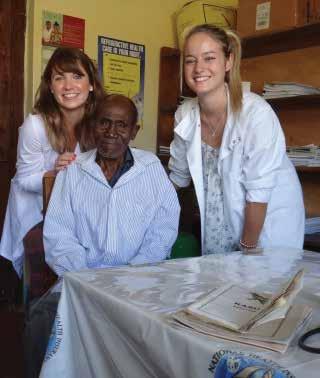
Rachael said: “As part of my placement in Tanzania, I spent two weeks in the paediatric department, where I took part in the malaria, HIV and malnutrition clinics, taking patient’s histories down and learning how to overcome language barriers to communicate.
“The next two weeks were spent in the labour unit, where I witnessed a significant number of emergency C-section deliveries. Many of the mothers faced complications during childbirth predominantly due to malnutrition.”
On their return to the UK, Rachael and Biomedical Science student, Lottie Reeves, launched the fundraising campaign #ProjectIringa. Their mission was simple – to improve healthcare for the people of Iringa through the donation of medical equipment.
Rachael said: “Whilst I was out there, we managed to donate £2,000 to the hospital for essential supplies such as urine bags, syringes and surgical screws. It was fantastic to see how a small sum of money made such a significant difference.
“Since returning home, we have already raised upwards of £13,000, allowing us to send over 600 pieces of medical equipment, including an operating table, ultrasound machine and ECG machine. We are now setting our goals towards providing a brand new anaesthetic machine to improve the safety of surgical interventions that are carried out.
“Studying at Northumbria University has been fantastic, and the work placement at Iringa Regional Hospital was a defining moment. To have been presented with the Heath Award at the end of such an amazing chapter of my life is unbelievable – it’s a huge honour.”
Professional and amateur student runners can improve their technique thanks to research into the benefits of barefoot running by a Northumbria academic.
You studied here in the 1980s before becoming a lecturer in criminal justice in 1994. What are the biggest changes you have seen both here and in Higher Education generally?
Northumbria is unrecognisable from when I arrived as a lecturer, and certainly from when I studied here. It is a much bigger, much more vibrant, engaging and confident institution. Student and staff numbers have increased, and the quality of what we offer our students has developed considerably.
At a personal level, the development of Criminology as a major subject area within the University is something I am particularly pleased about. When I joined Criminology was taught part-time, with a few modules delivered on politics and sociology degrees. Today it is a large single and joint honours programme, at undergraduate level, with a postgraduate route, a track record of PhD completion and a team of strong, committed, research-active staff. More generally, across Higher Education (HE), there has been a major growth in the numbers of people studying, coupled with changes in the way students pay for their education. HE is much more student or ‘customer’ focused, and operates within an increasingly competitive environment, with a much greater focus on quality, engagement, enterprise, research and partnership working.
What specialities do you think you bring to your role?
I do think that it is important to show leadership of learning and teaching, and to work closely with students and colleagues on assuring quality and enhancing the student learning experience.
We are committed to ensuring that the learning experience is reflective of, and informed by, student views so I try hard to engage regularly and proactively with students, including course representatives, to explore ways of enhancing our provision and the learning opportunities available. work closely with the Students’ Union and I also continue to teach Criminological Theory and supervise dissertations, which ensures maintain close contact with students.
Having been a lecturer, programme leader and director, as well as a head of a research centre and department, before moving on to more senior roles in executive management, I do hope that my experiences allow me to appreciate and understand the various contexts and dynamics that can affect the quality of the student experience.

How does teaching help you in your current position?
On a personal level, engaging with students in the classroom is an incredibly rewarding experience. It involves working together, exchanging ideas, challenging and critiquing ways of thinking, exploring contemporary social, political and economic debates, and
applying theories to real-world examples. It allows personal perspectives to be developed, challenged and confirmed and it creates lively and engaging discussion and debate about some of the big questions facing society today.
It is, I think, incredibly important that the person responsible for the strategic direction of quality and the student experience remains engaged professionally, in their discipline, as well as in the craft of teaching and learning.
Listening to the views of students is very important, as is the opportunity of being able to deliver and reflect upon new ways of working, such as technology-enhanced learning.
Equally important for me is that I remain a criminologist. Teaching and research allows me to continue to engage with colleagues within my subject discipline, and to continue to write and research on crime and victimization.
You mentioned technology-enhanced learning. One of your biggest focuses has been a move towards this. Can you explain why?
It is impossible to deny the impact technology has had on our own lives, from the way we shop or search for information to keeping in touch with friends and family. Today’s students have grown up around this technology and want to be able to communicate and work in a connected way – anytime, any place and anywhere.
Over the past year, we have been evaluating how technologies can impact on the learning experience. Pilot projects have included submitting assignments, marking them and receiving feedback online via our virtual learning environment; providing e-reading lists and broadcasting lectures via webcasts.
We are also developing our distance learning provision and have worked to improve access to teaching timetables.
These changes are important. I am a firm believer that technology can enhance the learning environment in a way that is stimulating, engaging, accessible and available. In this way, I believe that technology can help us deliver an outstanding student experience for all students.
How important is students’ feedback on their learning experiences, and how do you monitor student satisfaction?
For me, it is essential that we are able to provide all students with an outstanding experience during their time here. That covers all aspects – not only their time in the classroom, studio or laboratory, but also when engaging with academic and professional support staff. This includes the time students spend working in the library; making
future plans with the careers service or taking part in sporting and leisure activities.
The National Student Survey is one very important barometer that provides the University with a clear understanding of how students are feeling. This includes their experience on their course, as well as their reflections on studying and learning at Northumbria more generally. We also administer our own surveys to students in other years. We take the findings of each of these surveys very seriously indeed, and work hard to respond to the issues and views shared.
The idea of student engagement gets to the heart of partnership in learning and we are working to enhance further the ways that we engage with students and respond to feedback on issues raised. We are also looking at ways to ensure that the measures we put in place are the right ones and that they are making a positive difference. What do you feel makes Northumbria unique compared to other universities?
Higher Education is about transforming the lives of students through the provision of high-quality courses and excellent learning opportunities. Here at Northumbria, we have a real focus on the currency and relevance of what we deliver, and this can be seen in the work we do around employability and the relationship between research and learning.
I would hope that we give our students the opportunity to apply the knowledge and skills they learn on their course in a variety of rich regional, national and international settings.
This emphasis takes student learning into whole new contexts – such as our partnerships with BALTIC Centre for Contemporary Art and the Centre for Life, or through placements in a variety of institutions and organisations. An example of the excellence of our work can be seen when we were recently awarded the Queen’s Anniversary Prize for the community work of our Student Law Office. Our provision of vibrant, professional educational experiences, underpinned by high-quality research and critical scholarship gives our graduates some truly distinctive graduate attributes. For me, these twin pillars of employability and research get to the heart of what we do at Northumbria.
We are living in a global age. From education to entertainment, technology to transport, the world is connected like never before. For universities, like all businesses, this means competing in a global marketplace.
Just take a look at the map above. What looks like a snapshot of travel connections between the UK and the rest of the world, is actually something much more exciting than that. It reveals the truly extensive global reach of Northumbria University, Newcastle. Each line shows a country where Northumbria is actively bringing its excellence to the world as a researchrich, business-focused, professional university. This supplement of Northumbria University News provides a brief insight into some of the roles Northumbria is performing on this global stage.
As a global university, Northumbria has helped lead the way for UK Higher Education and has been steadily broadening its international horizons for decades through high-quality partnerships and collaborations. It was one of the first UK universities to open offices in China and this led to expansion into Hong Kong where Northumbria is now one of the leading UK providers of Higher Education. Today, Northumbria has a global reputation for high-quality education, research and expansive links with industry. It has offices in India, China, Malaysia and Thailand and a presence in many more countries. With 10,000 international students from 135 countries and a base in two of the best cities for students in the UK, Newcastle and London, the University is creating a global learning community that is very
attractive for students throughout the world.
But what does it really mean to be a global university? For Northumbria, it is more than a buzzword or business strategy. It is about transforming lives globally. Northumbria is committed to creating a vibrant learning environment where high-quality students will thrive whether they are from Newcastle in the North East of England or Newcastle, Australia. Students will have an international experience regardless of where they study and will leave Northumbria as global graduates capable of competing for the very best jobs internationally.
Being a global university means taking the outstanding experience offered by Northumbria to countries around the world, but it also means continuously invigorating the learning environment at our campuses. International students breathe fresh energy into our University and city, helping to share knowledge, experiences and different perspectives to create a rich, vibrant community for all. It is also about internationalising the classroom for UK students, giving them the chance to work on international projects and study abroad.
Northumbria’s commitment to partnership working with prestigious institutions around the world provides
opportunities for academic and student exchange, research links and collaborations. Every successful connection adds further value to the outstanding experience we offer, while building the University’s global reputation for excellence and enhancing our students’ graduate employability. Northumbria’s partnership with BINUS International in Indonesia to create the BINUSNorthumbria School of Design is a perfect example of the University’s successful approach to working with like-minded institutions where there are synergies of strength to meet market demand.
Northumbria is demand focused; responding quickly to the needs of all its stakeholders, be they students, businesses or partner institutions. This can be seen in the range of courses available to international students with six of the University’s subject areas in the top ten national recruiters of global students: Sport, Design, Business, Fine Art, Law and Electronic and Electrical Engineering. The University is also keeping up with the rapidly evolving technological demand from students. Our revamped distance learning courses, combined with our successful collaborative ventures, offer the chance to study toward a Northumbria degree
without ever coming to Britain. The future will see many more creative technological solutions to the way we deliver our courses.
The global market is a fast-moving and challenging environment. UK
Higher Education remains in high demand, but Northumbria faces growing competition for international students from other UK universities. The University is more than ready for these challenges and has an ambitious vision for its global future. Northumbria is expanding into Africa, Latin America, the Middle East and parts of the Gulf region and is actively pursuing new partnerships and collaborative ventures. It is investing in new technology to enhance teaching and learning to connect its students across the world and bring the world to the classroom. The University is well on its way to having a new hub for UK and international students on campus. The Northumbria Global Centre will meet the needs of an estimated 50% increase in international students on campus who will make the University an even more vibrant place to learn.
Northumbria’s vision for its future is exciting and ambitious and filled with possibilities, but one thing is certain. Northumbria is going global.
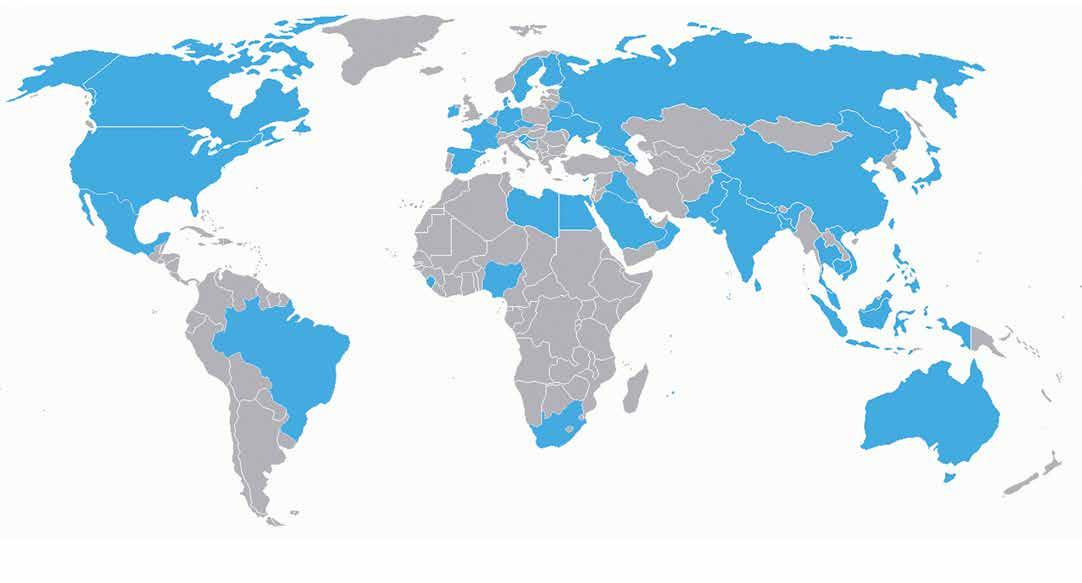
Journalism student Rosie Willan talks to Professor Peter Francis, Northumbria’s Pro Vice-Chancellor with responsibility for learning and teaching, about the importance of engaging with students and plans to use technology to enhance learning.

Northumbria University has become one of the leading UK providers of education programmes in Hong Kong – a position achieved by developing key partnerships and helping graduates build successful careers in an international market.
As one of the first UK universities to establish links in the region, Northumbria has grown its partner base successfully over the past 12 years. While Newcastle Business School courses have been the driving force behind much of the partnerships in Hong Kong, Health and Life Sciences courses are also offered in the areas of Sports Management and Coaching, Food Science and Nutrition and Biological Science.
These collaborations involve four of the territory’s leading institutions, Hong Kong University, Hong Kong Polytechnic University, City University of Hong Kong and Hong Kong Institute of
Vocational Education.
With the recent double AACSB accreditation – the lead story in this edition of Northumbria University News – there are opportunities for these partnerships to prosper even further.
This would allow more students to study Northumbria’s courses in their home country or in the UK, and more study and exchange opportunities for UK students in Hong Kong.
Ceridwyn Bessant, Associate Dean (International) at Newcastle Business School, said: “The Business School has now seen nearly 10,000 students graduate in Hong Kong since 2002 from our partnerships – a success which has
been built on our reputation, and which is being taken forward by our focus on academic excellence, innovative, research-informed programmes and excellent learning experiences for students. We are particularly excited to be offering our new Business with Law programme as the latest edition to the portfolio of programmes offered.”
As Northumbria’s presence and reputation in Hong Kong, and elsewhere overseas, continues to grow, so will it attract more talented postgraduate students to come and study in Newcastle, creating new opportunities in their wake. One example is Master of Architecture
The big interview
Northumbria University News talks to Professor Paul Croney, Northumbria’s Deputy Vice-Chancellor who leads the University’s international development activities. Here he talks about forging academic partnerships with distinguished institutions worldwide and developing ‘Global Graduates’ – students who are equipped and ready to meet the challenges of the world’s employers.
student, Zenny Cheung, who is a graduate of City University of Hong Kong and whose postgraduate work at Northumbria has helped forge a collaborative partnership with City Uni, ETH Zurich.
Northumbria is committed to growing
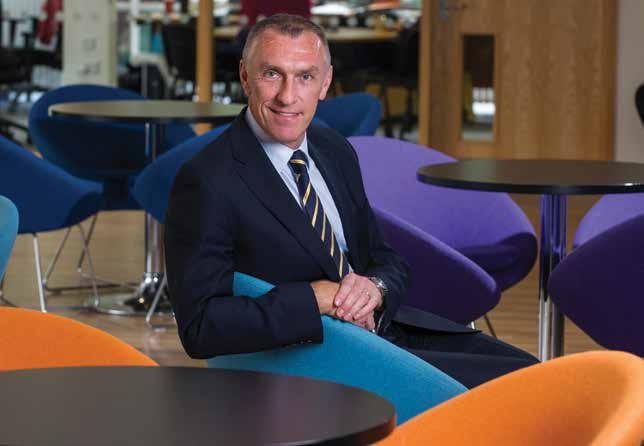
its international student community, and to helping all its students become global graduates, ready to compete and take advantage of opportunities across the world. Its reputation and partnerships in Hong Kong are a clear example of how the University is making good on this commitment.
Northumbria’s vision to expand its global footprint into Latin America could see a carnival atmosphere coming to campus.
Brazil, the world’s fifth biggest country, is riding high after the 2014 World Cup and its successful bid to host the 2016 Olympics. It has a rapidly developing economy and ambitious plans to create global graduates out of its seven million students. Despite this, it is still a relatively untapped market for UK universities.

As a global university, Northumbria is already working hard to build quality partnerships and collaborations in Brazil as part of its international expansion plans. The University sees huge potential in Latin American countries such as Brazil, Colombia, Chile and Mexico – and the feeling is mutual.
Brazil has been one of the world’s top ten sources of international students for several years, especially with postgraduates as undergraduate courses are currently free in Brazil. Thankfully there are a wealth of funding and scholarships to support Brazil’s postgraduates looking to learn from the best overseas.
One of the main sources is the Science Without Borders programme, which launched in 2011. This scheme, part of a wider initiative to encourage 100,000 Brazilian students to study abroad by the end of 2014, aims to support pre- and post-doctoral students of science, technology, engineering and mathematics (STEM) subjects to go to international universities through funded scholarships.
The number of Brazilian students coming to the UK has increased significantly as a result, and
Northumbria’s excellence in STEM subjects, combined with a reputation for producing global graduates, is a big selling point.
Northumbria’s reputation for the quality of its teaching, research strengths, industry links and campuses in two of the best cities for students in the UK, Newcastle and London, is turning heads in Latin America. Add to this a certain cultural compatibility – sociable and outgoing Latin Americans are known to settle well in the friendly and vibrant North East of England (we’re sure a mutual love of football doesn’t hurt!) –and it’s no surprise that Northumbria is proving such an attractive proposition.
Northumbria is working hard to build relationships with high-quality institutions across Latin America. This provides opportunities for academic and student exchanges, research
The largest and most populous country in South America
The fifth largest and most populous country in the world
Brazil is a former colony of Portugal and gained its independence in 1822
It remains the largest Portuguese speaking nation in the world
Brazil was governed almost exclusively under military rule until 1985
It has the largest Catholic population in the world
Brazil hosted the 2014 World Cup and will host the 2016 Olympics
One of the world’s top ten sources of international students
Why is it so important for Northumbria University to have an international footprint?
Why is studying at an English university, and Northumbria in particular, so appealing to international students?
has been extremely successful for our university and we are very proud to be one of the leading providers of Higher Education in Hong Kong – one of the world’s most thriving cosmopolitan cities.
In the main, we partner up with public and private universities. This provides opportunities for academic and student exchanges and liaisons as well as research exchange agreements where we can explore shared academic and student interests. This leads to a rich and positive learning environment for our students, further enhancing their graduate employability.
Have we identified any new markets for international expansion/development?
How do we guarantee that students studying Northumbria programmes via partner institutions are having the same high-quality experience as those on campus?
We regularly undergo a rigorous Quality Assurance process for all of our collaborative ventures – with external auditors from the Quality Assurance Agency ensuring that the same high-standards are applied whether a student is studying in Newcastle or overseas. All of this information is publically available via the internet – further enhancing the prestige and global confidence in UK Higher Education.
collaborations and knowledge sharing. Agreements have been signed with Brazil’s Universidade de Sao Paulo, Universidade Federal de Sao Paulo, Estacio de Sa, and the Universidade Federal de Pernambuco, building on a 10-year student exchange programme with Mexico_Universidad Iberoamerica, which has also boosted Northumbria’s profile in the region. There are also exchange agreements in place with Chile’s Universidad de Chile and Colombia’s Universidad de Los Andes. This commitment to working with prestigious partners overseas, combined with the University’s global reputation as a hallmark for highquality, has resulted in a steady growth in the numbers of Latin American students coming to Northumbria. And importantly, when they do come here they are really enjoying the Northumbria experience.
“Latin Americans, particularly those from developed countries, are generally very sociable and outgoing,” says Northumbria’s International Partnerships Manager Alejandra Vicencio. “They learn English quickly and have a very positive opinion of the UK. They love Newcastle and settle in quickly.”
Alejandra added: “Northumbria has more than 60 students from Latin America on campus and we expect this number to continue growing rapidly.
We have collaborations with some of Latin America’s finest institutions, including the Universidade de Sao Paulo, which has been ranked as one of the top 100 universities in the world.
“Our Latin American working group meets twice a year to discuss how we will continue to grow our presence in these countries and bring more
students to the UK in the future. We visit Brazil twice a year to attend recruitment fairs and other key events, and we have extensive links between academics. There are also strong relationships in Chile, Columbia and Mexico, and we will shortly be visited by the Dean of the Business School from Universidad de Chile.
“We will see more and more Brazilian and Latin American students on campus in the coming years and that’s a great thing for both the students and the University.”
Northumbria’s ambitious globalisation plans clearly match Brazil’s own vision for its students to become global graduates. And with so much in common, the University’s relationship with Latin America can only continue to grow stronger.
Now, who’s for samba?
Universities thrive when they attract the world’s brightest minds to both study and teach on their programmes; to push the boundaries of our thinking and to challenge the status quo. By attracting high-quality students and academics to our university, we ensure that Northumbria is a recognised hallmark for high-quality education and academic research throughout the world.
It is often said that the world is becoming a much smaller place. With modern technology and faster transport networks, the economies of the world have become interdependent and international boundaries have ceased to be the barriers they once were for businesses.
Students graduating from our courses become ‘Global Graduates’ – competing in a global labour market for graduate jobs. We take our responsibility to give our students the best opportunities to succeed in their lives very seriously. We do this through quality partnerships and collaborations with universities and businesses around the world and we are very proud of our track record in this area.
British Higher Education is quite rightly regarded as one of the best in the world – largely due to the fact this it is so publically scrutinised against very exacting standards. As a result, students coming to study at British universities are assured that they will receive a highquality education.
We also benefit from English being the global language of business, so students can expect to increase their prospects in accessing the global labour market while helping to prepare themselves for the world of work.
Northumbria’s reputation for the quality of our teaching, research strengths and expansive links to industry – coupled with a base in two of the best cities for students in the UK, Newcastle and London – means we are a very attractive university for students throughout the world.
What would be the risk to the future for Northumbria if we did not expand our international operations?
Quite simply, we would be doing our students and academic staff a great disservice were we not to expand
internationally. Not only would we risk falling behind our competitors, but we would also risk jeopardising the future prospects and careers for both our students and teaching staff.
Sharing knowledge, experience and different perspectives breathes fresh energy into universities. Through our collaborations and partnerships with other high-quality institutions around the world, we challenge and invigorate our learning experiences for our students, while building a global reputation for excellence which enhances their employment prospects following their studies.
Which countries do we currently operate in?
Lots – and the list is constantly growing!
Not only do students come and study on our programmes from 135 different countries, but we also have distance-learning opportunities and collaborations with high-quality partners around the world. This offers students the chance to study towards a Northumbria course without ever coming to Britain.
We focus our efforts in areas where economic development is booming; places such as the Far East, Russia, Brazil, China, India, Malaysia and Singapore –and many more besides. This approach
We continue to look at opportunities to expand in those countries where economies continue to develop at great pace. The model we have developed over many years in our established markets can be exported to places such as Latin America, the Middle East, North Africa and parts of the Gulf region. Under the right set of circumstances, we would look to find a like-minded university or partner who could bring the skills and local knowledge to help develop our plans.
Would we ever aim to have a campus overseas?
Perhaps in the fullness of time, we might look to do this. However, the model we have in place that has been developed over many years has proven to be very successful for us.
Our preferred approach is to collaborate with a partner who brings local knowledge – be that financial, legal or cultural.
To set-up a Northumbria campus would require a lot of investment –and a degree of calculated risk. At this moment in the University’s history, we feel that we can deliver a stronger student offer via strategic alliances, where students benefit from the value of a Northumbria degree that is delivered locally to them.
This may change at some point in the future, but our current strategy works most successfully for our current situation.
How will we use technologyenhanced learning to develop our international presence?
Technology offers a great opportunity to develop our curriculum, while delivering a high-quality education to a greater number of students who perhaps cannot afford to come to study on our programmes in the UK. Through web-based learning and other online developments, we will make our courses available to even more students.
This is an exciting development for Northumbria and we have recently made almost 20 courses available online for distance learning. Ideally we would like to have all of our courses available as an option in this way and we will continue to develop our virtual learning plans over the coming years.
How important are awards and accreditations to international student recruitment?
They are absolutely vital. Awards such as the AACSB accreditation for our business courses provide a kite mark of quality. Students and their parents look at these accreditations and it gives them the confidence that their time and money is well-spent on studying a Northumbria University course.
This also links back to my first point about producing ‘Global Graduates’ who are ready for the demands of the global labour market. Employers also look at our awards, pedigree and our global reputation for academic excellence and it gives them the confidence to employ our graduates.
Northumbria University is a top study destination for international students looking for a globally-recognised degree and an outstanding experience they will carry for the rest of their lives.
Northumbria is the university-of-choice for many, thanks to a reputation for academic excellence combined with a focus on promoting employability skills to help graduates launch successful careers.
Some students, however, need a helping hand with the transition to life and study in the UK. This is why the University is working in partnership with training and education provider QA Higher Education and has opened the Northumbria University Pathway College.
By choosing one of Northumbria’s pathway courses, international students have the opportunity to develop their current English skills and achieve the required academic qualifications to undertake an undergraduate or postgraduate course.
The Pathway College brings together an effective balance of skills and knowledge to deliver courses designed to prepare students for study at Northumbria, enabling them to gain skills that will last a lifetime.
Rob Carthy, Northumbria’s Director of International Development, said: “We are delighted to working in partnership with QA on this exciting facility for our international students,
as it will provide a great preparatory experience for those who are going to progress onto degree study.”
Courses offered for the first intakes include the International Foundation Programme to support students in developing their English language ability, academic knowledge and study skills to meet the entry requirements for the chosen undergraduate programme.
There are a number of foundation routes that allow access a wide range of undergraduate subjects, including business, art and design amongst others. There is also the Graduate Certificate in Business, which supports students in managing the transition into postgraduate studies in Business, Management and other associated areas.
At the heart of Northumbria’s offering is the desire to give its students a competitive head start in their future employment and career choices, and to do all it can to ensure their time at university is life-enriching.
“International student recruitment is a huge global operation, led by a dedicated team based in the UK who are extensively supported by expert staff in our four regional offices in China, India, Malaysia and Thailand,” says Deb.
“Northumbria was one of the first UK universities to open a regional office in China over a decade ago, which supported the development of our presence in Hong Kong and South East Asia.
“The regional offices are also responsible for recruitment in neighbouring countries. They are our local experts who can break down language and cultural barriers to represent Northumbria and promote the benefits of a Northumbria degree. Together with UK-based colleagues they attend higher education exhibitions, visit schools and colleges, and maintain excellent relations with our agent network.”
Northumbria was recently ranked one of the UK’s top 15 universities for the number of students studying its degrees in their home countries, either via partnerships or distance learning.
Explaining how this works in practice, Deb said: “Our partnerships with other institutions contribute significantly to Northumbria University’s global reach.
She said “Some encourage their students to study overseas for a period of time, so we welcome many students on campus for a semester or a year. This type of study abroad arrangement also means that our UK-based students can choose to study part of their programme overseas.
“Other partnership arrangements allow the delivery of Northumbria programmes at link institutions, meaning students can study exactly the same degree in their home country as they would on campus at Northumbria, and they graduate with a Northumbria degree.
“We also have an excellent and growing range of distance learning courses, meaning that students can study one of our degrees from their own home, in their own time.
“This combined activity helps us to extend our reach and reinforce Northumbria’s reputation as a truly global learning community.”
In one of Northumbria’s most innovative partnerships, students spend their first year studying medicine in Newcastle before travelling to the stunning Caribbean island of Grenada to continue their studies at St George’s University.
The School of Medicine at St George’s University is renowned as one of the world’s leading international centres of medical education and academic excellence.
The University has been working to enhance its provision in distance learning in recent years to fit around the differing lifestyles and needs of our international communities. Thanks to use of the latest technologies, students can now become part of our multinational, multicultural online community.
Postgraduate courses, including Education, Business, Construction, Computing, Law and English Literature, are all available to study online, with support available through video, phone calls and email.
Ama Carmichael, who studied Computing and Information Technology from her home in the Caribbean while working in her full-time job, travelled to the UK this summer for the first time to graduate with her classmates. She spoke to Northumbria University News about her distance learning experience.

“Coming to Northumbria was a ‘wow’ experience for me,” said Ama, who lives in St Vincent and the Grenadines.
“Although this was my first time on campus, and in the UK, have had a lot of contact with my lecturers through video and phone calls so it’s been fantastic to meet them in person.
Ama earned a distinction for her dissertation project which investigated the implementation of green information and communications technologies for the government in her home country.
“I’ve received a lot of support from my tutors, despite having to work around the time differences and my working hours. All the staff I’ve worked with contacted me to say congratulations.
The ceremony was really special and know definitely made the right choice to study with Northumbria. feel like all the hard work has paid off.”
Ama’s project supervisor, Rebecca Strachan, was delighted to finally meet her on the day of graduation. “It’s not an easy option to be a distance learning student and combine postgraduate study with a full-time job but Ama is an excellent exemplar of how students rise to this challenge,” she said.
Northumbria University offers a wide range of postgraduate and distance learning opportunities for students.
Founded in 1976 by academics who had been educated in the United States, Canada, Europe and many Commonwealth countries, the founding members were keen to create an innovative curriculum that would combine the best of American and British medical traditions. Today, the School is dedicated to developing outstanding doctors and improving health standards and healthcare delivery systems throughout the world. Northumbria University first began working with St George’s in 2002 and over the next five years developed the Keith B. Taylor Global Scholars programme, providing an exciting new route to becoming a doctor and giving students a truly international experience.
Keith B. Taylor, an Oxford-educated, former Professor of Medicine at Stanford University who subsequently became Vice-Chancellor of St George’s, was an eminent English physician who had a vision for St George’s to develop strong links with the UK.
Students enrolling on his Global Scholars programme can choose to spend their first year of pre-medical study in the tropical island of Grenada,

or in the bustling city of Newcastle at Northumbria’s city campus. The University’s Drill Hall has been transformed into a teaching facility specifically for St George’s students. It includes an anatomy lab used to conduct teaching on plastinated cadaveric specimens and anatomical models, a 240-seat lecture theatre and three flexible teaching spaces. Students also have the opportunity to use X-ray, MRI, CT and ultrasound techniques. Their second year is spent in Grenada before moving on to two years of clinical rotations in hospitals and clinical centres in the USA, Canada, the UK or Grenada. On completion, this leads to a Doctor of Medicine degree.
Since 2007, more than 1,300 students – primarily American and Canadian –have chosen to spend the first year of this medical sciences programme at Northumbria.
One student, Brook Ruffo, tells of the reasons why he chose to study in the UK on page VI.
Professor Kath McCourt, CBE, FRCN, Executive Dean for Health and Life Sciences programmes, said:
“Northumbria University is committed to building its global reputation, research profile and increasing the number of international students on campus. Our partnership with St George’s is a key example of how this works in practice.
“Our strong and growing collaboration with teaching and research staff working on joint projects across both institutions is delivering high-quality research publications from both organisations and increasingly large numbers of international students coming to study at Northumbria each year.
“We are fortunate that the partnership with St George’s brings us some fantastic students. They are taught by the national and international experts in healthcare that we have in the North East and have the opportunity to learn first-hand about the NHS and the delivery of care from both a UK and European perspective.
“The Keith B. Taylor scholars are all focused on benefitting from a global experience and see their time in Northumbria as enhancing their CVs. All, without exception, speak highly of the opportunities this brings them.
“They not only utilise our high-quality laboratory and clinical practice settings, but they also work in the health and social care sector as volunteers, and outside of study, they are able to enjoy the culture, scenery and friendliness of the North East and take advantage of our excellent links to Europe for further travel.”
Dr David Holmes, the Associate Dean of Basic and Allied Health Sciences at St George’s, worked at Northumbria
University for 35 years before joining St George’s to lead the programme four years ago. He added: “If you want to be a physician you need to have a very intensive academic programme, and this one is not only intensive, but innovative.
“The course is particularly attractive as it gives students a truly global experience. They can study here in this vibrant former industrial city. It’s very appealing for international students with its historical sites and for constantly coming up as being one of the UK’s best cities for students, before moving over to Grenada to study in one of the most picturesque campuses in the world.
• St George’s is the capital of Grenada
“St George’s has a strong affiliation with more than 70 hospitals and clinical centres, not only in the Caribbean and USA, but also in the UK, Canada, Kenya, India and Thailand. This ensures that students on the Global Scholars programme have a truly distinctive educational experience and the unique opportunity of experiencing different ways of life and different healthcare systems.”
Scan this QR code for more information on the Keith B. Taylor Global Scholars programme.
• The island was discovered by Christopher Columbus in 1498 but was not colonised until 1666 by the French, when it was purchased by the governor of neighbouring Martinique
It was given to Britain in 1763 following the Treaty of Paris. The main port town, Ville Forte de Royale, was renamed St George’s after the patron saint of England
• The island is a popular tourist destination
• The country’s main exports are nutmeg and spices including cocoa, cloves, vanilla, mace, cinnamon, ginger and sugar cane
• It was severely damaged by Hurricane Ivan in 2004
For students looking to follow their passion or develop their skills, location is no barrier to learning, thanks to Northumbria’s exciting range of distance learning courses.
8,000 international students from 135 countries study Northumbria’s programmes either on campus in the UK or at a partner institution in their home country. So what makes them choose Northumbria over other universities? Northumbria University News spoke to International Marketing Manager Deb Ions to find out how we are attracting increasing numbers of international students.
Working and studying abroad can be a life-changing experience. It provides students and graduates with new perspectives and improved career prospects, as well as unforgettable memories. Thanks to Northumbria’s extensive networks, our students enjoy the opportunity to travel and immerse themselves in another culture, helping them to become truly global graduates with the experience required by global industry. Northumbria University News takes a look at some of the international opportunities available to our students.
Northumbria is part of the Erasmus programme which provides students with a funded opportunity to study or work abroad in a European country. With over 90 Erasmus partners in 21 different countries, there’s lots of choice in terms of locations close to home, and students can also choose to study at partner institutions in a number of countries including the United States, Canada, Japan, Australia, Thailand and Korea. An exchange programme usually lasts one semester, over which time students earn credits towards their Northumbria degree. International scholarships are also available to successful applicants, with funding available for students to study abroad. They undertake a range of ambassadorial activities for the University and share their experiences with others on their return.
Twenty-four year-old Brook Ruffo, from Vancouver, Canada, chose to study the first year of his medical degree at Northumbria through the St George’s partnership (featured on page V).
“Having never travelled to the UK before, saw this programme as an opportunity to experience a different culture and do some travelling,” he explained. “I knew that with the time constraints of a medical career, it would likely be my last opportunity to see a different part of the world for quite some time. Living in the centre of somewhere as historic and as exciting as Newcastle has been an amazing experience.
“Northumbria University has been a fantastic institutional setting for continuing my education. The facilities are very modern, without sacrificing the historical backdrop that the city of Newcastle is known for, and the faculty have been extremely accommodating.”
Alongside his studies, Brook has joined the University’s water polo team, which has helped him to integrate with fellow students and the local community. “Playing water polo has become a large part of what enjoy most about living in Newcastle,” he added. “Through this have been able to experience several cities throughout England that we have travelled to for competitions. have also travelled to Italy, France, Spain, Scotland and the Netherlands with the friends have made. would absolutely recommend this course.”
Two Law graduates are travelling to Colombia to learn more about the challenges faced by human rights lawyers.
Hannah Burton and Lisa McGrady will join more than 60 lawyers from the UK, USA, Canada and Europe to attend the Columbian Caravana – a convention of international lawyers who monitor human rights abuses faced by legal professionals in Colombia. Organisations, including the United Nations, have expressed concern at Colombia’s human rights record, widely known as being one of the worst in the western hemisphere.
Hannah and Lisa, who have just completed the M Law Exempting (Bar Professional Training Course), will hear testimonies from lawyers and their clients, helping to foster a greater understanding of international legal issues, and promote knowledge exchange between cultures.
Opportunities such as this significantly enhance students’ learning experiences and career prospects and the University actively promotes them to its students. Hannah and Lisa each secured a Law School travel award to allow them to take part in the convention.
Principal lecturer, James Gray, said: “Students study human rights law but the reality of the struggle to advance and protect human rights in other countries can sometimes seem quite remote. Meeting lawyers who do this vital work is a great opportunity and will no doubt be hugely instructive.”
Lisa said: “The trip will give us first-hand experience of the challenges faced by lawyers who have suffered human rights violations, of how conflicts are addressed and we’ll find out in real terms how that affects people. It’s going to be an amazing experience.”
Research by a Northumbria student is making waves in the Caribbean after she proposed a new way to design towns to prevent crime.
PhD student Victoria Gibson has attended conferences in Barbados and Trinidad & Tobago with her PhD supervisor to share her research on the concept of designing towns and cities to help deter crime. Her findings revealed that this can be achieved through landscaping public areas to make them more appealing to use, improving lighting, designing streets to increase pedestrian and bicycle traffic, and reducing enclosed areas.
Her proposals made a big impact and have now been included in Trinidad & Tobago’s draft National Spatial Development Strategy – its vision of sustainable development priorities over the next 20 years. She is now back on the islands undertaking field research for her thesis, while working on the project with the government’s planning department.
Victoria explained: “In Trinidad & Tobago, urban design is really bad in terms of crime prevention – with basic apartment blocks surrounded by 10-foot high concrete walls, a lack of open space, lots of dark alleyways and overcrowding, which all helps to generate a sense of fear.
“Our framework demonstrates how designing out crime can be applied to any context and how it overlaps and supports many other planning priorities. We’ve received a really positive response to our research so far.”
Northumbria has been praised for having the most student placements of any UK university at CERN – one of the largest centres for scientific research in the world.
CERN, the European Organisation for Nuclear Research, in Geneva is internationally renowned as the the birthplace of the World Wide Web, home of the Large Hadron Collider and as the lab where the Higgs Boson particle was famously discovered.
The number of Northumbria students securing placements at CERN has doubled in each of the last three years. The Science and Technology Facilities Council has described Northumbria as ‘blazing a trail’ for other UK universities in its relationship with CERN.
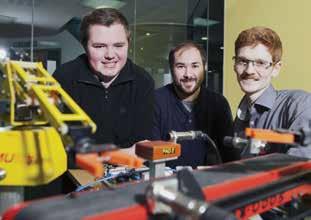
BSc Computer Science students Iain Steers, Paul Barella and Liam Dodd all completed work placements at CERN’s headquarters when the Higgs Boson was discovered in 2012.
Liam, who now works as a software engineer, said: “I walked into a job when returned to the UK because of my placement at CERN,” he said. “Northumbria’s excellent relationship with CERN is fantastic for students and a real selling point for the University.”
Iain, who went on to study for his masters at Northumbria, added: “We were exposed to technology at the very cutting edge, gained unique skills, and got to meet industry leaders and company CEOs, while working in an incredible environment surrounded by beautiful countryside.
“I’m in regular contact with CERN via email and plan to go back there as a staff member after graduate.”
Paul, who also stayed on at Northumbria to complete his masters, shared similar hopes of returning to CERN: “It was great to work in such a multicultural environment. The placement was a genuinely life-changing experience. definitely hope to return to CERN one day.”
Jane MacKenzie, CERN Opportunities Project Leader, said: “CERN’s technology teams want students who are outward-looking, projectoriented team players, and who have a real industry focus. Northumbria students fit this bill perfectly, and the University has worked really hard to foster links with CERN and to help students in their applications.
Students Iain, Paul and Liam who all worked at CERN
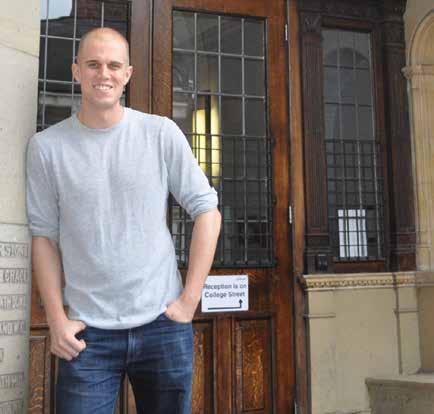
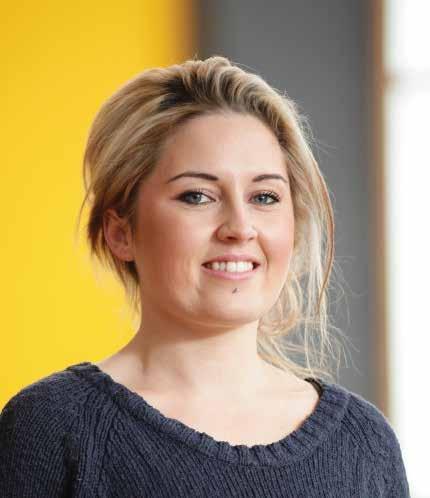
Tom Pilkington has scored his dream job after graduating from Northumbria University – helping with the design of Qatar’s FIFA World Cup stadiums.
The Building Services Engineering student joined engineering firm AECOM UK team after graduating. Working with Zaha Hadid Architects, AECOM are designing the Al Wakrah stadium for the 2022 World Cup in Qatar and this became Tom’s first project for the firm.

“They say you always remember the first project of your career and that couldn’t be more true in my case,” said Tom. “I’ll certainly never forget working on a FIFA World Cup stadium.”
Hosting the World Cup in Qatar has attracted a lot of media attention already, with news reports expressing concern over the high temperatures the players will have to endure. Tom has been involved in the strategy and design of the cooling systems within the stadium, which will emit cooler air across the playing surface to aid the players.
Northumbria’s Building Services Engineering degree specialises in designing the systems which buildings need to operate effectively, including heating, lighting, air conditioning and electrical systems.
Tom credits his time at Northumbria as preparing him for work in this competitive industry: “My course definitely set me up for work in the architectural engineering sector.
“As part of my degree, had the opportunity to go on a placement year and would recommend it to anyone – it definitely made me more employable after graduation as well as improving my final year grades. It’s a great way to immerse yourself in the industry and set yourself apart early in your career.”
Lawrence Hughes, Programme Leader for Building Services Engineering, said he is very proud of Tom’s achievements: “Tom is one example of how graduates of the programme are highly valued within the industry. It is extremely gratifying to hear that Tom is playing an important role in such a major project within a year of graduation.”
Designs for Qatar’s World Cup stadium that Tom Pilkington is working on

Northumbria is working to increase the scale of its educational activity both in the UK and overseas. Adding international study to a CV demonstrates confidence, independence and drive and also gives real experience of working in multinational settings. Northumbria’s students are encouraged to spend time abroad on work placements and many go on to work overseas after graduation, quickly becoming true ‘global graduates’. International partners also have the opportunity to come to Northumbria and enjoy the best Newcastle has to offer. The University provides a truly collaborative global experience.
Northumbria’s fashion students have consistently enjoyed national recognition at Graduate Fashion Week, picking up numerous awards in the capital and securing top jobs in the fashion industry. But it’s not just the UK high street that’s benefitting –Northumbria’s talented fashion graduates are making waves right across the globe, securing senior roles with major high street brands and suppliers.
Katey Abbott, who graduated with first class honours in Fashion in 2004, currently works for Velmore –an international fashion company supplying clothing to major high street brands including Zara, M&S Collection and Autograph.
She originally worked for the company’s UK office and relocated to Shanghai in 2010 to help launch Velmore’s new international design office. Katey’s role includes extensive research, trend forecasting and the interpretation of new ideas into contemporary tailored products for the high street.
Another graduate working in China’s fashion industry is Aaron New, the current Creative Director for Selected – a brand owned by the international clothing company, Bestseller. Aaron has been working in Beijing for over seven years, and, during this time his company has recruited a number of Northumbria graduates.
Douglas MacLennan, the School of Design’s Director International Development and Recruitment, said:
“Fashion at Northumbria was originally designed in the early 1970s to prepare graduates for the high street brands who manufactured in the UK. As the programme was developed and refined, we realised that our successful design formula was highly sought-after and worked successfully at every design level within the global fashion industry.
“Initially, our recruits gravitated toward Europe; Daniel Hechter, Luciano Soprani, Nike and Adidas. Then we saw them working in the USA with companies including Ralph Lauren, Calvin Klein and Donna Karan. And now, as we can see with Katey and Aaron, they are starting to successfully conquer the current fashion growth area of the Far East.
“Northumbria graduates can today be found working within most international brand labels as contributory design team players or Creative Directors. It looks like we’re aiming for world domination!”
Anyone who would love to travel but can’t speak the language needn’t worry. Many partner universities teach their courses in English and there are usually opportunities to learn the language as part of the experience.
In addition, Northumbria offers all full-time students the opportunity to study French, Italian, Spanish or German as part of their degree through daytime and evening classes. These are available for beginners through to advanced level, ensuring that it is accessible to all and complements students’ current degree commitments.
career the edge
Northumbria is working hard to increase its international profile and reputation. This encompasses both partnerships with overseas universities, businesses and organisations and the recruitment of international students who become global ambassadors for the University. Staff are also encouraged to contribute their expertise to international academic conferences and projects. Northumbria University News takes a look at how one academic is working to raise the University’s global profile.
Professor Kath McCourt CBE, Executive Dean for Health and Life Sciences programmes, is a leading figure in international nursing.
Prof. McCourt has extensive experience across nursing and healthcare education. She began her career as a registered nurse and midwife in the UK before working in frontline care roles throughout the world, including Germany and the United States. She then joined the Freeman Hospital’s Cardio-Thoracic intensive care unit, where she went on to hold a number of senior roles in adult and paediatric intensive care, before moving into education.
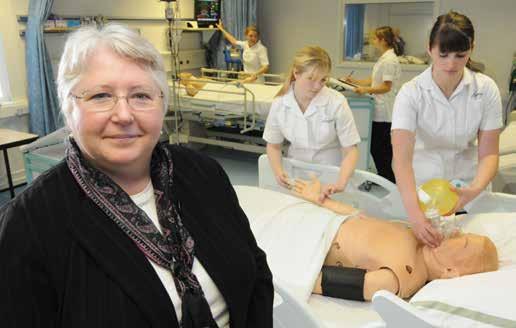
Today, as well as her role at Northumbria, Prof. McCourt is also Chair of the Royal College of Nursing’s International Committee, with whom she has led significant healthcare programmes in Malaysia, the Caribbean, Egypt, South Africa, the Middle East and China for both the Royal College and the University.
She is also the Honorary Colonel for 335 Medical Evacuation Regiment, part of the Royal Army Medical Corps, and was recently named the Vice President of the Commonwealth Nurses and Midwives Federation.
The Federation of national nursing and midwifery organisations in Commonwealth countries aims
to develop international nursing networks by sharing good practice and influencing health policy throughout the Commonwealth.
Prof. McCourt said: “As an active nurse and midwife have had a long involvement with the Commonwealth, delivering nursing leadership and education workshops, so know how important this international work is. The Commonwealth Nurses and Midwives Federation is a strong voice influencing change internationally and am delighted that will be able to undertake this important role.”
Speaking about the benefits her position would bring to the University, Prof. McCourt added: “Northumbria University has a recognised global reputation for nurturing high-quality professional nurses, with many well-established partnerships with other leading universities throughout the world.
“While personally, it is a very great honour for me to accept this role, am excited by the enhanced knowledge sharing and access to leading nursing figures around the world this will provide. look forward to bringing the benefits from these connections home to Northumbria and to our students.”
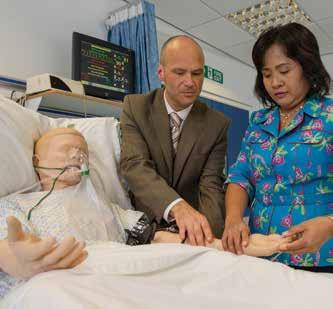
The new academic year has just begun, and for students and parents alike it is likely to be a defining moment in their lives. For many students starting university it will be their first real taste of independence, with all the expectation and fun of meeting new friends mixed with the natural emotions of leaving home. Here at Northumbria, we understand this and will do everything we can to make sure all our students have the most rewarding and enjoyable university experience possible. Northumbria University News takes a look at some of the support we offer to help students on a personal level.
Coming to a new university and a new city can be a daunting time.
Northumbria University News asked Law graduate Rochelle Martin, who is featured on page 4 of this newspaper, to give her top tips on how students can make the most of their time here.
To feel at home, make the most of accommodation by personalising it. For inspiration, try the poster fair on the top floor of the Students’ Union, or be creative and get ideas for decoration from photos and memorabilia.
Student loans will stretch further by shopping at the Grainger Market beside Grey’s Monument. It’s cheaper than the larger supermarkets for meat, fish, fresh fruit and veg.
Make the most of the many clubs and societies that Northumbria offers. They provide an opportunity to meet people outside of courses, learn new skills, keep fit, attend socials, take trips abroad – they all enhance CVs.
Thailand’s Ministry of Public Health recently visited Northumbria, to see how the University is using simulated patient mannequins to educate its nurses. Almost 80 nurse educators from colleges across Thailand spent two weeks at Northumbria learning how to use the mannequins, known as ‘SIM patients’, as part of healthcare teaching. On their return home they will share the knowledge they have gained at Northumbria with their own nursing students and nurse educators.
SIM patient mannequins of adults, children and infants are frequently used in healthcare teaching. The mannequins breathe, have pulses and can display altered heart and lung rhythms. They
can be programmed to display a range of conditions, including heart failure, stroke, asthma attack, collapsed lungs, septicaemia and blood clots.
Students can then practice and perform many core skills and emergency procedures on the SIM patients in a safe environment, ensuring they are both competent and confident to deliver high quality care.
Professor Kath McCourt CBE, Executive Dean for Northumbria’s Health and Life Sciences programmes, said: “Northumbria’s international reputation as leaders in simulation and healthcare education is growing at an increasing rate. We already undertake significant partnership work in South East Asia and previously we have welcomed healthcare professionals from Norway and Finland, as well as this large cohort from Thailand.
“As a professional university with a practical focus, we frequently work with leading healthcare organisations worldwide to help them to develop the skills of their own staff. Today’s visit by representatives from the Thai Ministry of Public Health is further recognition of our high quality provision.
Student Viliporn Runkawatt from Nakhon-Ratchasima in north east Thailand said: “My college has 600 nursing students and one SIM model so this will be a great help for us. I’ve enjoyed the teaching very much and have had big support from the lecturers.”
The excellent standard of one of Northumbria’s international partnerships has been recognised by peers in the British Higher Education sector, after being shortlisted for a national award.
Northumbria’s developing partnership with South Korea’s Kyungpook National University has been shortlisted for the International Collaboration of the Year title in the Times Higher Education magazine’s annual awards.
Collaborative activities with Kyungpook began in 2009 with Northumbria’s sport and business undergraduates undertaking study placements and internships in organisations including banks, sports agencies and multi-nationals such as Samsung and LG.
The relationship has since flourished with wider collaboration and engagement between both universities, increasing opportunities for students. Over the last academic year, Northumbria had almost 40 student exchanges with Kyungpook and this figure is set to grow.
Rob Carthy, Northumbria’s Director of International Development, said:
“The strategic partnership between Kyungpook National University and Northumbria has grown from strength to strength in recent years with successful links being supplemented by research and academic collaboration, and a broadening of the relationship across all areas of the institution.
“We are also delighted that so many of our undergraduates are choosing study opportunities at KNU for their development into global graduates and to enhance their career potential.
“Being shortlisted for this award is a significant achievement which builds on Northumbria’s growing global presence and reputation.”
Northumbria will find out if it has won the International Collaboration of the Year title in November. northumbria.ac.uk/international
Amid the excitement of coming to university, students have to learn how to juggle a number of demands which can become overwhelming and prevent them from getting the most out of university life. That’s why we provide invaluable support from trained professionals as part of Northumbria’s Student Support and Wellbeing service, which offers free and impartial advice in a number of areas.
Levi Pay, Head of Student Support & Wellbeing, said: “I’m proud to say that we are a university which really understands the duty of care we owe to our students.
“We know students choose to study at Northumbria primarily to take advantage of the outstanding academic experience on offer and the specialist support we provide underpins this by helping students stay focused and succeed on their programmes.
“We take this responsibility to be inclusive and supportive very seriously – not just because it’s ethically right, but because a healthy university community is a successful one. Our students’ welfare is certainly at the heart of everything we do.”
A team of qualified advisers are available to offer guidance on all aspects of student welfare, from registering with local doctors and dentists to handling financial issues such as student loans, benefits and council tax.

Students come to Northumbria with a range of needs and abilities. The University is committed to ensuring a positive and inclusive learning experience for all and support advisors work with over 1,700 students who have dyslexia or dyspraxia, long-term medical conditions, sensory and mobility impairments. Regular health
screening sessions and promotions are offered, as is confidential tailored support for anyone experiencing personal, emotional or mental health issues. The quality of this service was recognised last year when Northumbria was shortlisted for The Guardian’s Student Experience Award for its work in counselling and mental health support.
With students from 135 countries at Northumbria, many need help to adapt to British culture and make the most of their time in the UK. Advisors offer guidance with issues including visas and registering with local medical services through to accessing finance and driving in the UK. Chaplains of varied faiths are also on hand to provide pastoral care, spiritual life coaching or simply a listening ear.
Levi added: “On average, half of the student population access support from our service every year, with four out of five of those saying that the support they received helped them to focus on their studies and improved their academic results.”
DISCOVER MORE

NORTHUMBRIA UNIVERSITY has recently appointed its first Muslim chaplain to its chaplaincy and faith advice team.
The chaplaincy provides support to students of different faiths, philosophical beliefs and value systems and Mohammed Rahman, a classically trained Imam, will offer support to Muslim students.
Levi Pay, Head of Student Support and Wellbeing, said: “Mohammed will help ensure that our Muslim staff members and students – whatever their nationality, background or interpretation of their faith – feel part of an inclusive and welcoming University and have the best possible student experience.”
Find out which are the biggest student nights in town. Wednesday is sports night, when all the University sports teams go out to celebrate. There are also plenty of alternatives to night clubs in Newcastle. Try The Stand comedy club and catch live standup for just £2.
Try doing Come Dine with Me with friends and flatmates. This is an opportunity to brush up on cooking skills, it’s a good laugh and a home-cooked meal can go a long way to ease homesickness.
Take advantage of the 12-week summers – they won’t last forever. Use the time to travel or get some valuable work experience. Explore the different opportunities available to Northumbria students – take part in a summer school overseas or make a difference by volunteering or teaching English abroad. Northumbria has lots of travel grants available so there’s no limit to what can be done.
Most importantly, the years spent at university can be the best, so go in with an open mind and grab every opportunity with both hands!
Dr Carol Davenport believes Northumbria’s professional focus can provide real-world examples of the amazing things that students from science, technology, engineering and maths (STEM) disciplines have gone on to achieve in their careers.
Dr Davenport is leading the University’s three-year Think Physics project as it works with a number of North East schools and partners to target the gender imbalance in STEM education. Her comments came after recent research highlighted the need to broaden children’s aspirations around
science from primary school onward. Supported by a £1.2 million grant from the Higher Education Funding Council for England (HEFCE), Think Physics aims to change the way young people, particularly girls and under-represented groups, engage with science. The project, set to officially launch later this year, will demonstrate the breadth of career opportunities available across STEM disciplines. Northumbria’s outstanding partnerships with business and the University’s many graduates working in STEM industries will be vital to this.
“STEM lets young people have careers that can make the world a
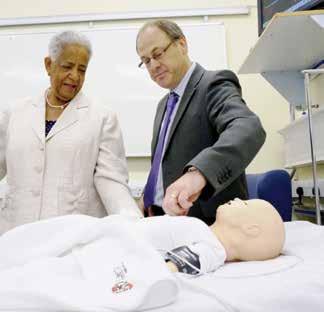
better place to live,” Dr Davenport said. “Science is a springboard for young people and we want to help them see that.”
Over the next three years, the Think Physics team will be working closely with 30 primary and secondary schools on a variety of activities. These will take place both in the Think Physics Link Lab at Northumbria’s city campus, as well as in the schools themselves. These activities will help put the science that young people are learning about in their lessons into ‘real world’ contexts.
Think Physics will also involve parents of younger children, helping them to ‘keep up’ with their children
in science education, as well as informing them about the possible careers that a qualification in science can lead to.
Dr Davenport added: “There has been a lot of work with secondary school children around STEM careers. Indeed, Think Physics will also be working with these young people. However, we know that many children have made up their mind about science by the end of primary school. We want to show primary school children and their parents that science, and physics, is part of their everyday lives.”
The Think Physics team recently attended the North East Skills Event at
Newcastle’s Metro Radio Arena, where they demonstrated a ‘gyroscope ride’ to young people in one of the ‘Get Skilled’ spaces. This was used to show the physics of angular momentum in a fun and engaging way and highlight how gyroscopes are used in modern technologies such as smart phones, computer games and aircraft. Northumbria offers a wide range of courses in STEM disciplines.
northumbria.ac.uk/thinkphysics


The Northumbria graduate won the Chartered Institute of Ecology and Environmental Management’s (CIEEM) Undergraduate Student Project Award for best dissertation. His project focused on different types of land use in Northumberland National Park and the variations this causes to invertebrates in its upland streams.

“I’m thrilled to have received this award from such a respected professional body in my field,” said Environmental Management graduate Scott. “The support I received from my supervisor and lecturers at Northumbria was extremely helpful from start to finish and enabled me to produce the dissertation to a high standard.”
The CIEEM 2014 awards, held at the Birmingham Botanical Gardens, were hosted by comedienne Helen Lederer and included speeches by leading environmentalist Chris Baines and Parliamentary Under-Secretary of State for Natural Environment and Science, Lord de Mauley.
Engineering and Environment Enterprise Fellow Dr Peter Glaves, who also attended the ceremony, said: “This award demonstrates the high quality and practical relevance of the work our environmental management students are producing. There has already been interest in Scott’s findings from consultants and land management organisations.”
CIEEM chief executive Sally Hayns said: “With more categories than ever before, this year’s awards ceremony
was an opportunity for us to shine a light on individuals and organisations across the country that are leading and developing pioneering ecology projects and research, many of which have made a substantial impact in protecting and enhancing Britain’s biodiversity.”
Since graduating, Scott has worked as an Assistant Ecologist for EcoNorth, an ecological consultancy Business based in Newcastle.
He added: “The award from CIEEM will be recognised by future employers and research institutions. It will really help to advance my career in ecology and environmental management. I’m
grateful to Northumbria University for giving me this opportunity and for all the support I received from academic staff during my degree.”
northumbria.ac.uk/geography
AC/DC’s lead singer Brian Johnson, Northumbria Police and Crime Commissioner Vera Baird QC and Baroness Howells of St Davids, OBE, all received honorary doctorates for their contributions to their respective fields. They were nominated for the awards by the University’s staff for their achievements, their links to Northumbria and for their sheer inspirational qualities.
Brian Johnson is lead singer of one of the world’s most successful rock bands – AC/DC have sold an estimated 200 million albums. He is a keen engineering and motorsports fan who enjoys racing vintage sports cars. He was recognised for the significant contribution he has made to the music industry for the past three decades.
Former student Vera Baird QC graduated with a degree in Law from Northumbria’s predecessor Newcastle Polytechnic in 1974. From her roots as Vice-President of the Students’ Union and editor of the student newspaper,

she forged an impressive career as a barrister involved in landmark civil liberty cases.
Vera’s career took a political turn after being elected as a Labour MP, later becoming a minister and Solicitor General. She became the first Police and Crime Commissioner for Northumbria Police in 2012.
Baroness Howells of St Davids, OBE first encountered racism when she arrived in England to study in the 1950s and has been an active campaigner ever since, helping to shape race relations policy in the UK.
After a distinguished and wideranging career which included being the first black woman to sit on the Greater London Council’s Training Board and the first female member of the Court of Governors of the University of Greenwich, she was appointed a peerage to the House of Lords in 1999. The honorary doctorates were presented during ceremonies for students graduating from Engineering, Law and Life Sciences programmes.
Northumbria’s innovative partnership with Ryder Architecture is continuing to make an international impact with a host of exciting projects on the horizon.
BIM Academy is a specialist building information modelling joint venture between the University and award-winning architectural practice, Ryder. It employs a number of Northumbria graduates and is currently working at the £400m M+ museum in Hong Kong following the completion of a successful project at the Sydney Opera House.
BIM Academy’s pioneering projects around the world help inform teaching and research at Northumbria while also supporting graduate employability in the global marketplace.
Professor Steve Lockley, Chair of Building Modelling, said: “BIM Academy provides a platform for Northumbria graduates to engage with leading edge technology, state-of-theart working practice and world class international construction projects.
“Graduates typically work alongside experts in the field of building information modelling for periods of six months or more and develop key skills that enable them to gain highlevel entry to employment in the design and construction sectors.
“Over 18 students have been employed by the Academy and the
majority are now working on prestige international projects in places such as Hong Kong, Dubai, China and Europe.”
Ryder Architecture has offices across the UK and is currently the preferred bidder for the creation of £200m police headquarters in Hong Kong. It will also be developing designs for a new hospital for the Chinese University of Hong Kong later this year as well as working on more exciting projects with BIM Academy at Northumbria.

Inspirational figures who have made an impact in the justice, human rights and music worlds were honoured at this summer’s graduation ceremonies.
Northumbria can play a key role in inspiring young people to change the world through a career in science, according to the director of the University’s Think Physics project.
As the new iPhone 6 and Apple Watch – designed by Northumbria graduate Sir Jonathan Ive, now Senior Vice President for Design with Apple – have just been launched, Northumbria University News takes a look at some of the products designed by our talented current students and recent graduates that are now on sale across the UK and beyond…
Apple Watch and iPhone 6

With phones and computing devices known to consumers all over the world, Apple have now launched the Apple Watch – its first product designed to be worn.
Prices start from £216. Available from store.apple.com/uk
Northumbria University actively supports its students and graduates to start-up their own businesses – we were recently named the fourth best university in the UK for graduate start-ups.
Graphic Design student Tyler creates original, creative and individual jewellery using pieces from vintage watches and clocks. He was recently highly commended in our Business Challenge competition.
Prices start from £12. Available from scogsjewellery.com
Fifty Shades of Grey, Keira Knightly and Starbucks – what do they all have in common? Well let’s just say they wouldn’t be what they are today if it wasn’t for the movers and shakers of 18th Century Britain.
Asignificant body of research, conducted by Northumbria academics, looks at themes from the long 18th Century (1660 – 1832) and the way in which historical events and developments have impacted on our lives today.
In November, this research will be brought to life through film screenings, public lectures, debates and even an 18th Century coffee house recreation as part of the national Being Human festival.
Relax in style and comfort with these unique, design-led furniture and interior products, also created by a 3D design graduate. James has even been profiled by Design Week magazine.


Available from jamesuk.com
National stores such as Habitat have snapped up 3D Design graduate David’s contemporary designs and you can too. You can even see his work on campus as he won a competition to design the gates to City Campus East back in 2007.
Available from davidirwin.co (yes, that’s right!)
Kieron Day –
Wardrobe Wingman
Corporate Management graduate
Kieron’s colourful fashion accessories for men are designed to brighten up the dullest of outfits. His colourbud lapel badges have even been spotted on Justin Timberlake’s chest!


Priced from just £8.
Available from wardrobewingman.com
Fashion Marketing graduate
Rosie creates stunning handmade headpieces and jewellery for weddings and formal occasions. One of her recent pieces even featured on the cover of Hello! magazine.



Available from rosiewillettdesigns.co.uk
A fun and quirky loose tea leaf company with unusual chocolate, fruit and sweet-shop flavours such as rhubarb & custard and Turkish delight, priced at just £4.75 each. Established by Early Years Education and International Human Resources Management students Stella and Jodi, you can try them out at omytea.com
Being Human is the UK’s first festival of the humanities, made possible by a grant from the School of Advanced Study, University of London, and supported by both the Arts & Humanities Research Council and the British Academy. As part of this national event, Northumbria’s academics will share their thought-provoking research directly with the general public to explore what it really means to be human.
So how exactly did the 18th Century shape the lives that we lead today? From health and celebrity culture, to literature and leisure activities, Northumbria’s research explores a range of inspiring and curious themes and discusses their relevance to modern society.
Can an illness be en vogue?
A major Leverhulme-funded project, Fashionable Diseases has seen Northumbria and Newcastle academics work together to explore how certain illnesses, such as melancholy, consumption and even biliousness, rose to the height of fashion in the 18th-century.

Clark Lawlor, Professor of Eighteenth-Century and Romantic Literature at Northumbria is director of the Fashionable Diseases project. He explains: “Whether it was ladies having attacks of the ‘vapours’ or aristocrats suffering from gout, the Georgian era provides us with many examples of diseases that appear to have associations with social, intellectual or emotional superiority.
“For example, when we think of artists and poets in this period, we might consider their struggles with melancholia and how such illnesses were given a certain amount of glamour. Could any poet of the 18th Century afford to be without at least a tinge of melancholia?
“In the 21st Century we are still affected by older mythologies of disease and creativity, and our research seeks to discover how labels can alter our conception of diseases. We will be sharing some of these findings during the Being Human festival, with talks exploring the fashionable diseases of Georgian Britain, as well as how mental illness affected the Royal Family in the 18th Century.”
The founding father of erotica
It wasn’t just poetic melancholy that caused a stir in the 18th Century. Author John Cleland paved the way for the likes of Fifty Shades of Grey with the introduction of Britain’s first erotic novel – Fanny Hill. The controversial writer is now under the
spotlight of Professor Richard Terry, Northumbria’s Head of Humanities. Professor Terry said: “It’s interesting that students often assume that, because Fanny Hill was written many years ago, it won’t be as explicit or controversial as the likes of modern novels, like Fifty Shades

“However, our views in terms of what is deemed acceptable have changed so dramatically over the years that while today’s readers may appreciate that erotic fiction deserves a place in society, they may struggle with some of the controversial themes that early writers such as Cleland explored.
“However, it’s fair to say that without Cleland’s controversial writing, Fifty Shades may never have existed, let alone be made widely available on the supermarket shelves!”
Professor Terry’s festival talk will take audiences into the life and times of John Cleland, explain how the most banned book in Britain came into existence and how it paved the way for today’s popular erotic novels.
As part of the Being Human festival, Northumbria’s academics will be reconstructing an 18th Century coffee house. Coffee shops started as places where people, who might not usually socialise, came together and debated politics, culture and fashion. They were the place to be if you wanted to find the latest news, and in fact, for many newspapers, a direct source of contributions and stories. Dr David Stewart, Senior Lecturer in Romanticism at Northumbria, is involved in organising the reconstruction event. He said:
“When Addison founded The Guardian, he set up a coffee house to encourage contributions, and people posted their entries through the mouth of a white marble lion’s head.” Over the years, these venues have become much more relaxed spaces. Today, however, it isn’t rare to spot the odd business meeting in Starbucks, and customers sharing newspapers.
Dr Stewart added: “As part of the festival, we will be recreating the buzz and energy you might have found in the 18th Century coffee shop. We’ll stick to a modern day cuppa though. By all accounts, 18th Century coffee leaves a lot to be desired!”
It’s probably no surprise that it was deemed unacceptable to read about Fanny Hill in the long 18th Century. After all, the general public were shocked at the idea of a woman treading the boards on a stage, never mind the sexual antics of a prostitute!
“Early actresses were often equated with prostitutes – they were seen to be whoring their bodies on the stage”, explains Northumbria’s Dr Claudine van Hensbergen, lecturer in EighteenthCentury English Literature. Dr van Hensbergen’s research explores the rise of the female actor following an Act of Parliament in 1660 that enabled actresses to take to the stage for the first time. She said: “While there were indeed some actresses who became more famous for being someone’s mistress than for their theatre performances, many became shrewd business-women who were involved in running leading theatre companies.
“The popularity of early actresses also inspired celebrity culture. The minute women started appearing on the public stage, their audiences were equally fascinated by their private lives, and the emerging print marketplace catered to this public hunger, printing biographies, scandalous accounts and even 18th Century pin-ups of them.”
Without these important developments and legal shifts taking place, we probably wouldn’t have heard of Keira Knightly, Kate Winslet or Renee Zellweger. Can you imagine if Bridget Jones had to be portrayed by a man?
Dr van Hensbergen’s public lecture will ask whether our modern fascination with the private lives of celebrities is really such a new development, and explores case studies of powerful female figures who proved, against the popular opinion of the time, that women could, in fact, succeed.
Northumbria University’s mission is to create and apply knowledge for the benefit of individuals, communities and the economy. To find out more about how our research is applied in practical contexts, Northumbria University News invited two academics to outline how their research is having an impact on real-life issues.
Tony Machin, Director of Programmes for Public Health & Wellbeing, has been working with Newcastle’s Live Theatre, to explore themes of homelessness and addiction raised within Wet House –an award-winning play written by Northumbria graduate Paddy Campbell. Here, Tony discusses how the play relates to academic disciplines and perspectives studied on Northumbria’s courses.
Prior to becoming an academic, my background was in mental health services as a specialist nurse working with people with problematic alcohol and substance use. I worked with a range of service users addicted to substances such as alcohol, cannabis, amphetamine and heroin. I also interfaced with a range of services set up to help alcohol and substance misusers.
In the autumn of 2013, I was asked to become involved with a new play being staged at Live Theatre, which drew on aspects of my professional and academic background.
Wet House, which was written by Paddy Campbell and directed by Max Roberts, both Northumbria graduates, is based upon Paddy’s experience of working in a ‘wet house’. These homes are basically last-ditch accommodation provision for people with alcohol and substance issues who are not at a stage where they can stop their problematic use.
In public health services terms, this provision is classed as ‘harm reduction’, given that offering such an environment at least prevents homelessness and its associated problems.
I worked with the cast and production team during rehearsals to ensure the accurate portrayal of alcohol and substance misuse and its management within the play.
Paddy and the team had crafted a production which very realistically captured the atmosphere and ethos of the setting, and the play went on to win several awards within subsequent months.
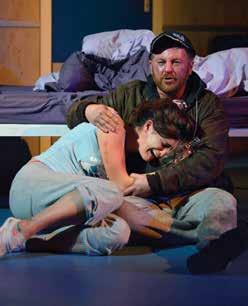
As an academic given the chance to observe actors ‘plying their trade’ in my area of specialism, I was struck by the opportunity to reflect upon the complex interplay of factors woven within the narrative. This included topics as diverse as homelessness and related poverty, addiction to alcohol and drugs and how this addiction can overlap with mental health problems, criminal activity and social problems more generally.
There were also interesting links with how we provide treatment for these substance misusers and the societal attitudes to those within this particular group, as well as the sheer difficulties we face within the health and wellbeing professions of working with these individuals, many of whom are in a very damaged state, both mentally and physically.
Our practice-based disciplines within the area of Public Health and Wellbeing, such as Social
specialises in research on gender, crime and victimisation. Here she discusses how her research is having an impact in safeguarding children.
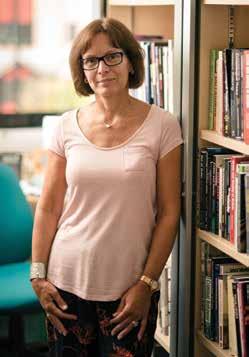
It is now over 40 years since second wave feminism engaged us in consciousness raising and provoked increased speaking out about violence against women and children in the home. The 1980s and 1990s saw the development of services for victims and survivors of domestic violence, rape and sexual assault and improved responses, not only in the United Kingdom, but in many parts of the world. Their development and implementation continues to gather pace today. Yet, as those who are routinely engaged in safeguarding children and young people know, and, as the news headlines sadly graphically bring home, the lived experiences and voices of the young are all too often ignored. Too many children and young people still reside in unsafe environments, witness appalling scenes of interpersonal violence, and become embroiled in violent attacks.
Northumbria believes that all young people with the ability and desire to learn should have the opportunity to access higher education – regardless of their background or family circumstances.
showed me that it was possible, that universities are welcoming and friendly places and that the financial support was there for me.”
Rachel now works as a Graduate Ambassador as part of Northumbria’s Student Recruitment team. She added:
“The summer school really inspired me and I wanted to show other students that university is an option for them. So I signed up to become a student rep while I was studying and was able to take part in other summer schools, assisting with the events and activities that were on offer.
“When the opportunity came up to apply for a full-time Graduate Ambassador role it was perfect. I now plan and deliver the events so I am gaining more experience in this area.
I also coach for a gymnastics academy part time, so everything that I am doing is really building on my graduate CV and the essence of my coaching degree – encouraging people to achieve their potential.”
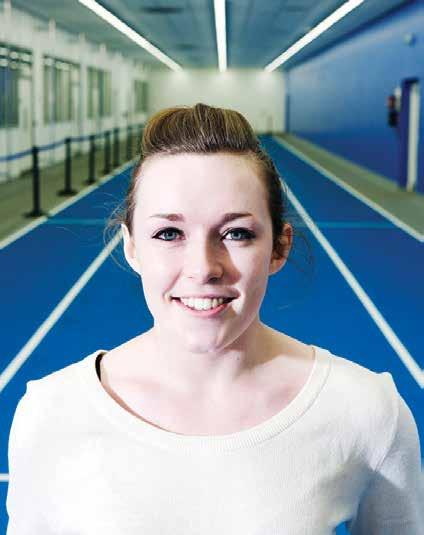
There are hundreds of shows, exhibitions, concerts and festivals happening in Newcastle each week. Here are just a handful…
THE BEATLES

19 September –
31 October Northumbria University Gallery
The exhibition of preparatory drawings and watercolours illustrate the history of The Beatles from the formation of the band to the final break-up and subsequent solo careers for the Fab Four.
19 September – 31 October
Brita Granström draws upon her Swedish roots to blur the boundary between observation and imagination, reality and dream.
Dry the River – 9 October

Performing their new album, Alarms in the Heart, Dry the River take to the stage at Northumbria Students’ Union. Tickets £12.50 plus booking fee.
They Used to Call it the Moon exhibition at Baltic 39 31 October 2014 – 11 January 2015
The Newcastle Vintage Fashion & Textiles Fair
2 November
I am also working on a longer-term piece of research funded by the British Academy that concerns the needs of and support for families affected by child sexual abuse.
Work, Occupational Therapy and Nursing, all play critical roles in the effective treatment of such addictive conditions. At Northumbria we also offer other programmes, including Psychology, Sociology, Criminology, and even the likes of Housing, Built Environment and Education, that all have relevance to the complex interplay of themes raised within this dramatic production.
Although Northumbria’s partnership with Live Theatre has offered a truly innovative insight for me as an academic and practitioner to look at these issues in a new light, perhaps the University can create opportunities to collaboratively examine complex issues such as those raised within Wet House in a way which can inform more affirmative health and social policy? Whatever your academic discipline, I can thoroughly recommend seeing this play as an entertaining and thought-provoking experience. Wet House returned to Live Theatre after being named one of The Guardian’s top 10 plays of 2013 and runs until 11 October. Tony will join an expert panel at Live on Sunday 5 October to explore, with the audience, questions relating to the play.
The Hearing the Voice of the Child conference focused exclusively on children and young people who have experience of living in violent households, including those who have been able to escape. It emerged out of concern about the safety of the child. This starting point brought together colleagues with research interests around violent crime, including the vulnerable and victims and witnesses of crime, with practitioners working towards safeguarding the child, and connected well with a broader shared interest on inequality and injustice. There has been comparatively little attention given over to violence in the home compared to violence in public though there is a wealth of research on intimate partner violence. The awakening to the issues of violence, safety, needs and support for those in the home and familial environment provokes a range of child protection concerns. Safety, and the needs of and support for those affected, both directly and indirectly, are the subjects of research projects that are being carried out by colleagues across Northumbria University.
Working alongside Professor Peter Francis, have conducted research and written extensively over the last 20 years on the subject of invisible crimes, social harm and criminal victimisation. The implications this poses for policy makers, practitioners and commissioners of services to support those in need are linked to an interpersonal violence needs assessment project we are currently working on. This project is being conducted for the Northamptonshire Police and Crime Commission on behalf of the Institute for Public Safety, Crime and Justice.
In addition to research within Social Sciences, colleagues across the University are also involved in projects relating to child protection. Dr Kim Holt, Head of the Department of Social Work and Communities and a Reader in Social Work and Family Law at Northumbria, has spent 30 years practicing as a social worker and a barrister in the area of child protection and family law and is a legal advisor to the British Association of Adoption and Fostering. She also chaired the government forum on child protection, and is an expert advisor to a number of universities.
Kim has researched and published extensively in the area of family justice; recently concluding a three-year project commissioned by CAFCASS that introduced the Family Court Advisor into pre-proceedings practice.
The research project has attracted ministerial and judicial interest in the context of the modernisation of the family courts. CAFCASS and the Ministry of Justice will consider the recommendations of this recently published research to influence best practice across all agencies working in child protection.
These are just a few examples of how applied and collaborative research at Northumbria is contributing to the development of policies and practices concerning the safeguarding of children and young people. By bringing our research endeavours together in this way we can really start to make a difference to the lives of children regionally, nationally and internationally.
northumbria.ac.uk/criminology
The University is involved in a range of outreach programmes designed to inspire young people to explore their study options, make informed decisions and unlock their career potential.
Working both independently and in partnership with Newcastle and Sunderland Universities, Northumbria delivers a range of activities to raise awareness among 10–16 year olds of the educational opportunities that they are entitled to. All three universities work closely with schools, local authorities, parents and carers to provide the guidance and support that is needed to inform decision-making.
Northumbria’s programme includes interactive events on campus for pupils in different year groups who have the chance to engage directly with current students to get a real taste of university life.
They gain an insight into the transition between school and university, and, at a practical level, learn about the financial options that are available to them. Pupils also take part in subject taster sessions and activities. One activity is the STAR Student game – a giant board game that subtly introduces pupils to Higher Education in an entertaining way, with a particular focus on STEM subjects
(Science, Technology, Engineering and Maths).
The innovative Think Physics project is another example of an initiative to inspire young people, particularly girls, to further their learning of STEM subjects. In partnership with regional schools and partners, the programme aims to encourage more girls and under-represented groups to apply to study physics (see article on Page 12 for further information).
Northumbria also offers outreach opportunities to over 16s, working closely with sixth forms. Residential Summer Schools for Year 12 students introduce them first hand to student life through an overnight stay in halls of residence, the chance to take part in subject taster sessions and allows them to experience the wider aspects of student life.
Rachel Hodgson, 22, attended one of Northumbria’s residential summer schools in 2009 to find out more about university life. She has since graduated with a first class honours degree in Applied Sports Science with Coaching. She said: “I come from a village where 40% of children are considered to be under-privileged and, while I was always keen to go to university, at times it felt more like a dream.
“Attending the summer school really
Kelley Evans, Student Recruitment Manager, said, ‘Northumbria’s outreach work is about introducing young people to the idea of university, opening up their minds to the wide variety of course options and ensuring that every young person knows that university is an option for them, regardless of their personal circumstances.’
northumbria.ac.uk/studentrecruitment
The fair will be packed full of traders from all over the country, selling their treasured vintage finds.
Skating@Life
8 November 2014 – 22 February 2015
Newcastle’s only outdoor ice rink returns to the Centre for Life for the winter. Lee Evans – Monsters UK tour
6-8 November
Packed with manic energy, uncanny observations and hilarious delivery. Russell Howard 16 December
One of the most popular comedians in the UK, Russell returns with the fantastic new tour, Wonderbox.
For more information on these and other events in the area, visit www.newcastlegateshead.com/whats-on
Two internationally acclaimed creative writers will collaborate on a homelessness project spanning the North East of England and Africa.
Laura Fish, an Orange Prizelisted author and Senior Lecturer in Creative Writing at Northumbria, will work with Billy Kahora, a highly-respected film maker, prose fiction and script writer, on a range of public engagement, research and student activities.
During Billy’s visit to Northumbria, the two writers will run workshops with young homeless people in Newcastle and Gateshead. The findings developed from their research activities will generate material for short stories, which will be shared with communities in Newcastle, Gateshead and Kenya.
Themes of home, homelessness, place, and identity run through both writers’ creative output and this latest collaboration aims to broaden their research interests and share them with wider audiences.
Laura said: “Billy is an eloquent and affective writer, deeply political. He deals with reality and his work is felt in the gut.
“The material written by those involved in the workshops can be edited together to produce short stories or longer passages, so that not just one voice will be heard, but many – to assist the homeless to speak for themselves,
and to be heard. However hard it may be, it is important for us to listen to those who often go unheard.”
Northumbria University’s full-time Creative Writing MA programme is a practical degree, designed for people who wish to become creative writers, as well as for those involved in teaching creative writing, or working in other areas of the writing industry.
The University’s Architecture courses have an excellent reputation across the UK and they have designs on even greater success in the future.
From award-winning graduates and multi-million pound live projects to excellent league table results and student satisfaction, Architecture at Northumbria has gone from strength to strength in recent years and is now ranked among the very best in the country.
And this year has been no exception.
In 2014, Architecture at Northumbria was named sixth in the UK in The Guardian’s league tables and broke into the UK top ten in the Complete University Guide, building on the success of previous years.
With students picking up their highest number of awards to date this year, while continuing to impress businesses and key partners with their work on live projects, the future looks very bright indeed.
Earlier this year, architecture students received prizes for their design work on The Sill, a £12 million project, aimed at bringing to life Northumberland’s proposed National Landscape Discovery Centre. The project, run in conjunction with Northumberland National Park Authority, and Newcastle-based architects JDDK, saw Matthew Glover and Megan Carmichael pick up awards for their designs, while Alex Erskine and Matt Chamberlain were runners-up and Jack Vickerman was highly commended.



Northumbria also hosted a gathering of northern schools of architecture at Stephenson Works in Newcastle. The second annual Northern Soul event saw Northumbria’s architects lead the way in a collaborative design challenge to reinvigorate Newcastle’s Stephenson Quarter.
Architecture rounded off the 2013/14 academic year by joining the University’s other creative courses for REVEAL, a stunning end-of-year Degree Show featuring the work of every student on the course.
Interior Architecture, in its first graduating year, has been equally successful. Following REVEAL, the programme’s first graduating cohort travelled down to London for the Free Range Interiors show at the Old Truman Brewery in the capital’s fashionable Brick Lane area.
Not only did Northumbria’s 20 Interior Architecture students make their mark on London’s creative scene, but Natasha Kwok took the leading award at the show, winning the IE (Interior Educators) Interiorist of the Year 2014 prize.

rehabilitation and hydrotherapy facility, which took the top prize.
Interior Architecture’s ‘London invasion’ was followed by more good news for the course, when it received 100% student satisfaction in the National Student Survey 2014.
Architecture has continued to build on its achievements when masters graduate Jake Boardman’s design thesis for a hydrogen-fuelled transport hub, was chosen as one of 20 designs, from over 300 entries from around the world, to appear in an exhibition at the American Institute of Architecture’s Centre for Architecture, in New York.
Northumbria’s Director of Architecture, Ben Elliott said: “Once again the Architecture courses at Northumbria have gone from strength to strength and we are massively proud of the achievements of all the students.
“We have had our highest number of students winning awards this year which is testament to their hard work and talent, and shows that the industry continues to acknowledge the quality of our work.
“Continuing our excellent studio culture, our high levels of graduate
employment and student satisfaction have also been acknowledged by the league tables, with the architecture programmes being sixth and seventh in The Guardian and The Times respectively.
“Our continued engagement with the industry has given rise to some very interesting projects, including working on the new Northumberland National Park visitor centre and projects at Seaton Delaval and Gibside with the National Trust. This is great for the students and really helps prepare them for professional practice once they graduate.
“The future looks very exciting for Architecture at Northumbria. We have set the bar very high and it is testament to the massive commitment and ability of our exceptional staff.”
After such a successful year, the challenge for Northumbria’s architects is how to build on this over the next 12 months.

But our award-winning students and staff are confident they will do just that. After all, their success is not a matter of chance, but of design.
Building experts from Northumbria have used the latest 3D laser scanning technology on an ancient room at Durham Cathedral featured in the Harry Potter films.
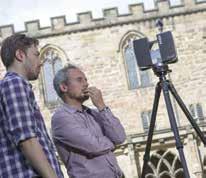
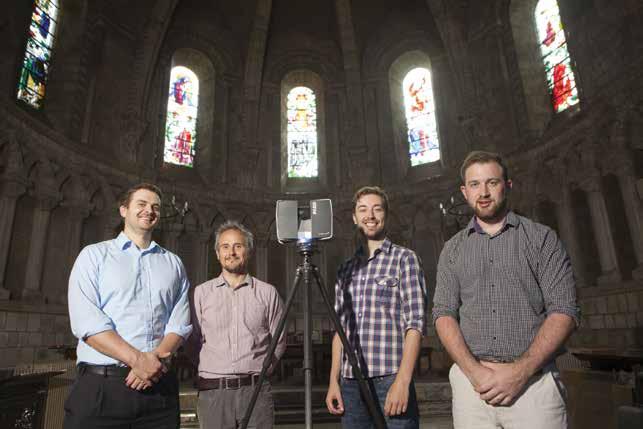
The Chapter House, which dates back to 1083, has been chosen to feature in a pilot project to demonstrate the benefits of the Building Information Modelling (BIM) process. Northumbria University and BIM Academy experts spent two days scanning the historic room, which doubled as Professor McGonagall’s classroom in the Harry Potter films, using technological wizardry that would have left Dumbledore baffled! The scan will enable the team to create a 3D model, that will provide Durham
Cathedral with detailed information about the room that they never had before. It will include a range of new insights, from accurate dimensions of the vaulted ceilings and walls to a survey of the stonework. This is a huge contrast to the traditional architectural drawings previously used to assess the room’s condition and will be essential to help understand and manage the property in the future.
Professor Steve Lockley, Chair of Building Modelling, said: “BIM Academy at Northumbria University
is working with Durham Cathedral
Property to capture and preserve information about the fabric of the historic monuments.
“They are using the latest developments in 3D laser scanning to record accurate details of a part of Durham Cathedral that was used as Professor McGonagall’s classroom in the Harry Potter films. If successful, this new method may greatly simplify how the physical condition of our monuments is recorded for preservation and maintenance by future generations.”
BIM Academy, a joint venture
between Northumbria and Ryder Architecture, has won a host international awards and has previously worked on projects at iconic buildings such as the Sydney Opera House and Hong Kong’s M+ Museum.
Northumbria University research
fellow James Charlton and Senior Lecturer Stuart Eve and Assistant Technician Matthew Dundas undertook the 3D laser scanning, while BIM Academy senior project manager Graham Kelly and BIM technologist Ben White created the 3D model.

Property and Facilities Manager at Durham Cathedral Tom Billington oversaw the scanning on behalf of the World Heritage Site.
Tom said: “Using modern BIM technology on a building like this is very exciting and the potential of such a survey is huge. There are two sides to our work here – the running of a world famous, well visited, large site and the conservation and protection of an ancient monument. The BIM and 3D laser scanning will help with all of this.
“Not only will it give us up-to-date images of the building in its current state and layout, which will help us

when planning things such as the installation and upgrade of new services, but it will give us accurate information about the building which we have never had before – things like the dimensions and ‘thickness’ of the vaulted ceilings and walls, which has implication when it comes to historical records and archaeological surveys.
“The scanning will give us an accurate stone survey as well, which will allow us to track the deterioration of the stonework and help us plan the next stage of conservation.
“There is no doubt that this type of scanning should be the way forward in all new build construction, but its implementation on existing buildings has been questioned throughout the construction sector. I think we may be about to put those queries to bed.”
The project with Durham Cathedral follows the launch of a new BIM for facilities and asset management consultancy service being offered by BIM Academy. BIM Academy’s approach supports clients in their transition from traditional methods to the use of digital information and 3D models to deliver greater value to businesses.
best
It’s official – Northumbria law students are learning in one of the most aesthetically pleasing law school buildings in the world.
The Best Choice Schools website has rated City Campus East 1, also home to Newcastle Business School, the second best of the world’s: ‘50 Most Impressive Law School Buildings’.
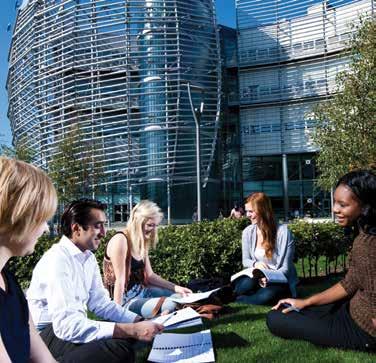
that honors the history and study of law’.
Outranking 48 other leading law schools, Northumbria was topped only by Durham School of Law, and was among just six UK law schools to make the Top 50 list.
reaffirms our ability to stand out on the global stage – above Yale and Harvard Law Schools in the US and the Faculty of Law in Oxford, here in the UK.
northumbria.ac.uk/abe
northumbria.ac.uk/abe
Natasha received the prize for her work at Gibside Hall in Gateshead, a project which saw a number of students create designs for how the National Trust property could be used in the future. These ranged from a gin distillery to a theatre, but it was Natasha’s design for a cancer
The website, which ranks higher education institutes across a range of factors, compared law school buildings across the UK, US, Germany, Singapore, Canada and Australia. Buildings were chosen for their ‘ingenuity, aesthetic beauty and commitment to creating an environment
Described as “futuristic and splendid”, the building was applauded for its courtroom, award-winning Student Law Office, and the focus on energy-saving and eco-friendly features.
“Being recognised for our originality and inventiveness, the quality and appearance of our buildings, and the overall ethos of the faculty, shows our commitment to offering a world-class facility and experience for our students.”
DISCOVER MORE northumbria.ac.uk/law
Kevin Kerrigan, Executive Dean of Northumbria Law School, said: “To rank so highly in this list is a great honour and
Students sitting outside Northumbria’s Business and Law building
It has been said that architecture is about people, not buildings. If this is true, then it is Northumbria’s students and staff who must be applauded after another outstanding year.1 Matthew Glover’s prize-winning design for The Sill visitor centre in Northumberland 2 Megan Carmichael’s design work for The Sill, which won the ‘Alternative’ prize 3 Jake Boardman’s design thesis for a hydrogen-fuelled transport hub 4 Another of Matthew Glover’s designs for The Sill 5 Another of Jake Boardman’s designs, which were exhibited at the American Institute of Architecture (AIA) in New York 6 Natasha Kwok, who won IE ‘Interiorist’ of the Year 2014 in London for her designs for the National Trust’s Gibside Hall 7 (Left to right) Matthew Glover, Megan Carmichael and Jack Vickerman who received awards for their work on The Sill
learn from the best
The accolade came as Team Northumbria celebrated its best ever season, achieving a record number of points to finish 8th in the BUCS national league table – the first time Northumbria has achieved a top 10 place – as well as winning the historic Stan Calvert Cup trophy against rivals Newcastle University.
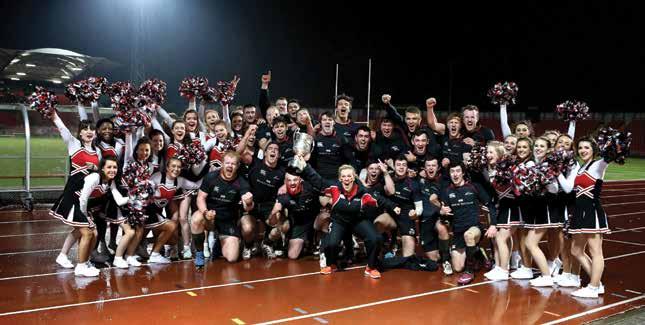
During the season, Northumbria was also rated as being within the UK’s top five universities for sport by the Times Higher Education magazine.
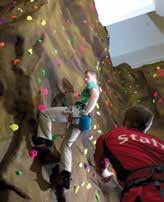
Head of Sport, Colin Stromsoy, was presented with the award at the annual BUCS Conference in Swansea by broadcaster John Inverdale. He said: “Sport has always been a key part of the Northumbria student experience, but this year has been truly recordbreaking.
“In the last three years we have climbed from the top 20 into the top 10
Northumbria University has topped off a record-breaking sporting year by being named the most improved university for sport in the UK by British Universities & Colleges Sport (BUCS).
in the BUCS league and the dedication and motivation shown by everyone in the team has been phenomenal.
“Winning this award and being named the most improved university for sport in the UK is just the icing on the cake.
I was hugely proud to accept the BUCS award on behalf of all of Northumbria University Sport’s students and staff who have worked so hard to achieve everything we have.”
Sports facilities on the University’s city campus include the stunning Sport Central which features a sprint track, swimming pool, multi-purpose sports halls, squash and fitness courts, a huge gym and a 3,000 seat arena.
Coach Lane Campus also has an outstanding fitness centre and outdoor pitches, and the nearby Bullocksteads facility is home ground to many of the University’s outdoor teams including rugby, football and lacrosse. nusportcentral.com
The £329,000 grant, the third largest awarded to any education provider in the country, will enable the University to develop a new ‘Club Northumbria’ programme over the next three years.
The Sport England scheme aims to encourage almost 180,000 students at universities across the country to play sport regularly. Through Club Northumbria, the University will offer a wider programme of activities for students at all levels of sporting ability, including new sports programmes for students with disabilities.
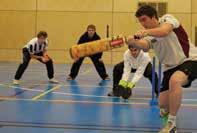

The programme will both encourage students to try new sports and to develop skills in those that they already take part in, with sporting competitions and specialist coaching provided. Multi-sports activities will also be available at various locations, including partner venues across the city and at the new Trinity Square accommodation in Gateshead.
Colin Stromsoy, Head of Sport at Northumbria University, said: “We have transformed the sport offer at Northumbria University over the past few years and this additional Sport England funding will now enable us to do even more.
“We are absolutely committed to offer students the UK’s very best university sports programme that has top quality activities on offer irrespective of background or ability. Sport England have recognised our success over recent years and through this new commitment will help us deliver our widest ever range of activities which will be available at various locations in and around the city, as well as on campus.
“The Sport England funding will also be complimented by increased funding from the University for both participation and performance sport. This demonstrates in real terms how much the University truly values the positive role that sport plays at the heart of the student experience.”
Doors 6:30pm, tip off 7:30pm – Sport Central
Newcastle Eagles v Sheffield Sharks – 10 October
Newcastle Eagles v Bristol Flyers –17 October
Newcastle Eagles v Surrey United – 24 October
Newcastle Eagles v Glasgow Rocks – 14 November
Newcastle Eagles v Durham Wildcats – 5 December
Newcastle Eagles v Manchester Giants – 12 December
Wednesday 1 October, Kingston Park
Doors open 6:30pm, kick off 7:30pm
Join
official!